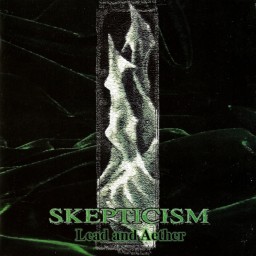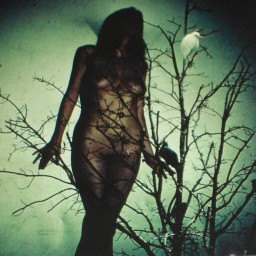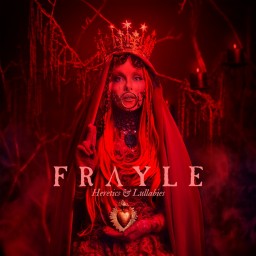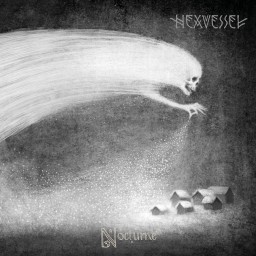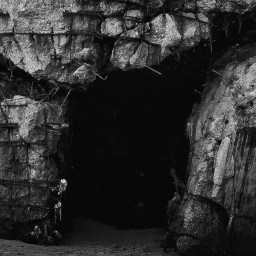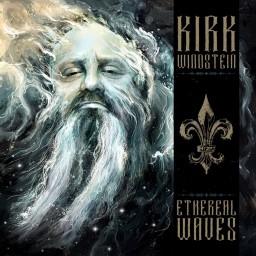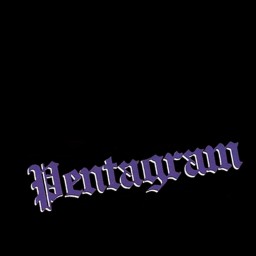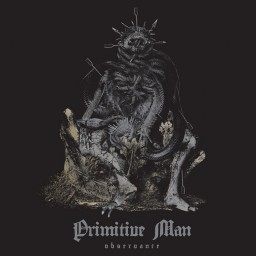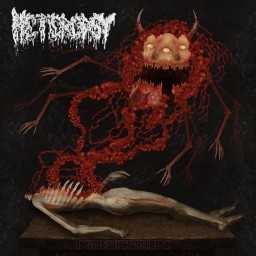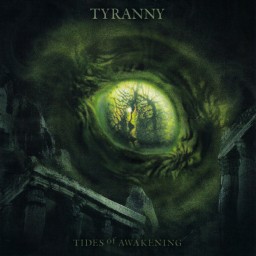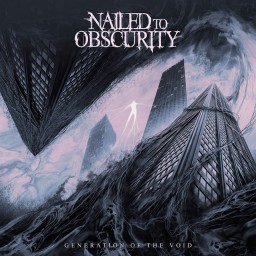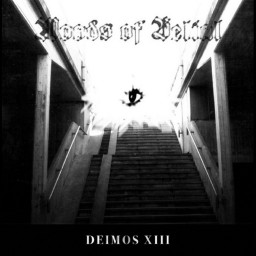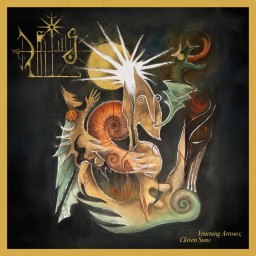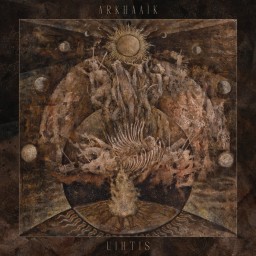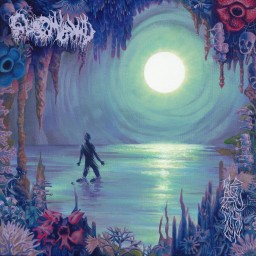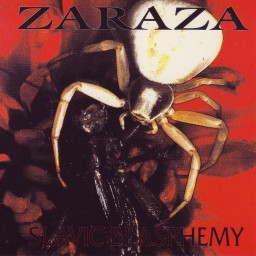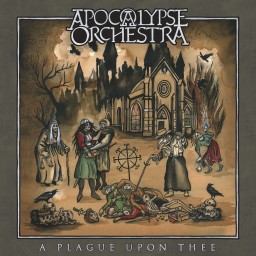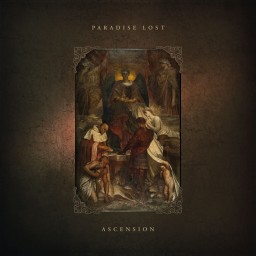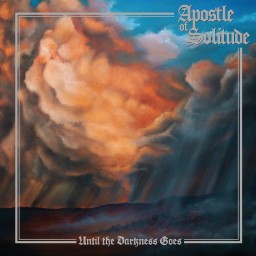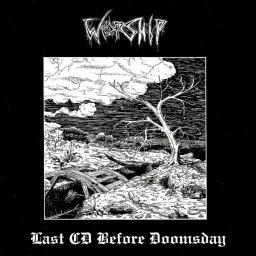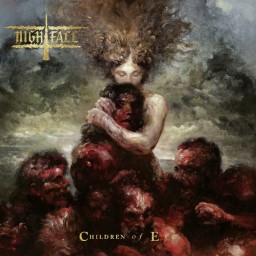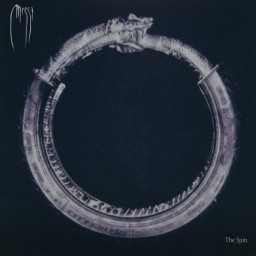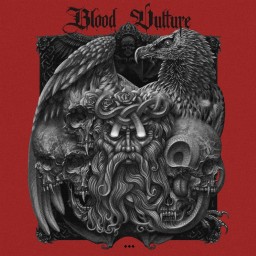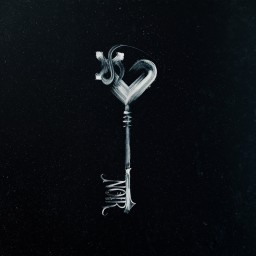Latest Reviews
An initial listen to Swallowed's "Lunarterial" left me somewhat dumbfounded and confused I must admit. From Vinny's effusive description of the album in the feature thread's introduction this was apparently right up my street, yet I really wasn't feeling it. The disconnection was so pronounced that I really doubted my own ears and my interpretation of what I had heard. Determined to get to the bottom of this, I persisted and have now clocked up four or five listens over the last few days, both through intently concentrated listenings and as background whilst doing other tasks. Whilst my initial reticence has been alleviated somewhat, the truth is, I am still not completely sure how I feel about this, or even if I will ever be able to make a definitive judgement on my appreciation of it. I think this is one of those albums where there are moments that make me think "OK, right. Now here we go" when things click and fall into place and show glimpses of the album I envisioned getting at the beginning, but on the flipside there are also parts of seeming random chaos that literally make me want to turn it right down in order to lessen the discomfort I am feeling.
Anyway, this is an album that draws on a number of extreme metal influences, old-school death metal, death doom, disso-death, war metal and even drone metal, all combining to produce an, undoubtedly intentional, disconcerting feeling that all is not well or right with the world. To this end, at least with me, this was inordinately successful, although the effect was to alienate me from what I was hearing rather than drawing me into its aural maelstrom. The transitions from doomy oppressiveness to outright blackened violence overlayed with jagged shards of dissonance just overwhelm me I am afraid. At times the band sound a lot like Mayhem at their most experimental, a phase of the norwegian black metal legends that I have never been a big fan of. In an inversion of Vinny's view it seems, my favourite track is actually the 25-minute closer, "Libations" which appeals to the doom and drone fan in me and within the drone-y confines of which the band's tendencies towards dissonance makes more sense to me and if it had been released as a stand alone EP I may even have toyed with the idea of purchasing it.
I would claim to be a fan of extreme metal, but I guess an album that really pushes deeply into unconventionalism such as this, makes me question whether that is truly the case. Things still have to make sense to me and for many stretches "Lunarterial" really doesn't. "Libations" aside, which is actually really growing on me, I can't in all honesty say that I would return to this in the future.
Another Boris album, another slab of noise-drenched, riotous stoner metal. The Japanese crew just sound like they were having so much fun when they recorded this album. Some of the tracks here are just so insanely energetic and anarchic they sound like they have produced the perfect soundtrack to a riot. There are songs that poke their heads above the general mayhem, such as the industrial dance-beat affected Ghostly Imagination, the ominous, sax-laden Blah Blah Blah or the closing piano-led (Not) Last Song, but mostly this is an album to break stuff to! I know we are all supposed to stroke our chins and think deeply then write reams of crap because it's Boris, but fuck that, just slam it on, bounce around the room and have some fun.
Mike Scheidt seems like a nice bloke. Numerous interviews and documentaries that I have seen of late with him present have led me to this conclusion. Having come to understand his roots, influences and musical tastes has helped him to become more than just “that guy out of Yob who nearly died” as I sometime fear the music media typecast him as being. Whilst I have no doubt Mike is every part the survivor he gets portrayed as being, there is an intensity to his live performances that burns brighter than anyone else’s that I have seen over the many years that I have witnessed extreme music. Survival instinct aside, Scheidt’s a warrior when he has a guitar in his hands and a mic in front of his chin. Enduring a tough upbringing at the hands of peers that saw him plunge into the world of punk, metal as well as new wave (which remains a strong favourite of his musical tastes still) I imagine relates him to a lot of folks who didn’t fit with the “in” crowd in their younger years.
As a result of these insights, I feel I have more awareness of the depths present in Yob’s music. Something that may well have been previously lost on me. Understanding how Mike learned to stretch his legs (and hands/fingers of course) to move away from bar chords and pick out notes, becoming unafraid to change things up, has helped me to notice some of the nuances, touches and inflections present in the music of Yob. As a band who have always struck me as a trio who produce music with an enormous amount of structure, Yob have a reputation with me for building enormous soundscapes. Clearing the Path to Ascend was the most vast listening experience I had heard to date with the bands discography. With just four songs taking up over an hour of music, there was clearly little room for error here.
One could argue that with such a short array of lengthy tracks on offer, Yob could just throw the kitchen sink at each song and hope for the best. They don’t. As I mentioned earlier, if there’s one word I would associate with Yob, it’s “structure”. There is a level of patience required to be invested by the listener with this record, one that for me personally reaps some reward. The build ups take their time, but never to the detriment of the songs. My attention does not wane during these moments and let’s be honest, who comes to a doom record to be deterred by repetition? Scheidt’s nasal crooning and his guttural growls are probably the weakest part of Yob’s sound for me, yet I could not see any other style working half as well. They are delivered (like the rest of the music) from the heart. It is all about the riffs and heavy bass presence though for me, even if this does mean the drums are often lost in the fuzzy rumble of the mix of the album. It doesn’t feel like a deliberately obtuse production decision has been made here though, as I could argue more percussion just simply is not needed.
In a genre where most records can sound the same, Clearing the Path to Ascend uses cosmic atmospheres in places to provide “pauses for breath” I guess and to add variety. They are probably the most difficult aspect of the album to contend with for me. I would be happy for them to be ditched in favour of more pummelling for my ears. However, at over an hour long, I can see why the record needs these lulls in intensity. Yob manage to bounce the tracks back each time though, so as undesirable as it may be, I can forgive them at least. Listening to his album led me to the wider discography and I think that in comparison to some other albums, this one lacks any exemplar tracks. As strong an album as it undoubtedly is, there’s only really ‘Marrow” that deserves real note for the absolute poignancy of its delivery. No individual criticisms on a track-by-track basis then, but there are better Yob albums out there.
Montréal's Big Brave are a band I'm only recently getting into. This, their fifth album, is a mix of drone metal and post-metal with huge-sounding, pounding drum beats and discordant guitar work interwoven with some gorgeous female vocals that sound like a mixture of Siouxsie Sioux and Bjork. It's five tracks span less than forty minutes, so this isn't a long drawn-out affair unlike many drone-adjacent releases, but is focussed and kind-of to the point, for drone metal anyway. The band manage to cram a lot in and squeeze a lot out of their forty minutes, conjuring up haunting visions of crumbling edifices and long-deserted streets, especially on the title track, for a style I want to call post-human metal.
The newest record from Swedish death doom duo Enshine is a pretty decent, if a little slow. I was worried about this album at first as the first two tracks didn't do anything for me. "Heartbliss" in particular had that really out of place transition between two different songs halfway through, before becoming a guitar solo for the remaining two/three minutes. "Distant Glow" was a bit of an eye opener. For one, it's entirely instrumental and secondly, it's the best track on the record. I was going to highlight this review with some snarky remark of "if you're best track on the album is the instrumental interlude, we're gonna have a serious problem" but that's not actually what happened. You see normally with these death/doom albums they start strong and lose momentum in the second half. As the album becomes more moody in its second half, it becomes considerably better. The slower tempos of "The Purity of Emptiness" and "Reignite" and the ample space given out by the vocals cause these songs to feel more lived in and do not feel forced like how "Heartbliss" or "Where the Sunrise is Felt" do.
This is a decent enough of an album if you can overcome the slog it takes to get going.
Best Songs: Distant Glow, The Purity of Emptiness, Reignite
In terms of my exploration of The Fallen clan, one sub-genre that is noted as “not for me” is drone metal. Unable to fathom the appeal of Sunn O))), Earth or Khanate despite numerous attempts, I soon got to the opinion that this was never an area of music that I was going to gel with. Then I remembered Wolvserpent. I recalled how I had become lost in the ethereal beauty of their Perigaea Antahkarana and Aporia:Kala:Ananta releases from over a decade ago. How the haunting strings of violins played by a seemingly melancholy soaked set of troubled spirits had soothed my frantic thoughts before a crashing riff came in to wipe away any lingering fears in my soul.
As soon as I put Blood Seed on recently, I quickly found myself in the exact same space. This is the debut from the now defunct duo, from back in 2010 when the pair had been around for five years prior as Pussygutt. Brittany McConnell handled the drums as well as that tormented violin sound and Blake Green covered guitar and vocals. Not that vocals play a big part in the debut (or indeed any other release from Wolvserpent), the band have always been about the music, and this was set out very clearly on their first release. Side A is a single track, ‘Wolv’ and the ‘Serpent’ track makes up side B. I can imagine a wolf or two padding around some dark forests, hunting for prey, searching for signs of life to take from unsuspecting animals to the first track. The choral style howls and guttural gurns perhaps imitating the language between the menacing pack of predators (or maybe the screams of the victims?). At over twenty-two-minutes long, this track requires attention to fully embrace the magic of it, yet I find this a very easy ask to comply with.
‘Serpent’ lands a little shorter in duration at the eighteen-minute mark. Straight out the blocks, I can envisage a coiled snake, slowly unfurling itself to the nightmarish atmospheres that open the track. Brittany’s violin is accompanied by some distant howls (the ‘Wolv’ I suspect) courtesy of the guitar of Blake and a tense atmosphere permeates between the instrumentation. You may have noticed by now dear reader, that for someone who opened this review by remarking how little they like drone metal, I have managed to wax lyrical about a drone metal release for over two paragraphs thus far. In my defence, I think Wolvserpent are a different offering to any of the other bands that I mentioned above. They have more obvious “sections” to their tracks, incorporating varied elements of sludge (around the six-minute mark of track 2), doom, dark folk, chamber music as well as drone also of course.
Although repetition is still a mainstay here, there is enough going on at any given time to keep me focused entirely on Blood Seed, which is the similar experience that I have of their other releases I am familiar with. In short, all of drone may well not be a write off for me after all.
“Caverncore”, the 2010’s movement borne out of bands taking the sounds of Incantation and maxing out the reverb was my bag at the time. Having notched up around two decades of listening to death metal already, this sub-genre at least gave me something new to listen to that walked the fine line between blackened death metal and death doom. Except, depending on the levels of saturation the average death metal fan was willing to go to into this realm, the frantic squall of Portal was to be found in the darkest corners of this new soundscape. Bands like Finland’s Swallowed, had zero qualms about taking the extremity of metal’s most alienating sounds and incorporating them alongside more traditional tropes.
My theme for the feature releases I have picked this month has been single album bands who split thereafter. A “tragedy” themed month, I guess. This certainly resonates with Swallowed. The duo of Ville Kojonen (drums and vocals) and Samu Salovaara (guitars and vocals) employed a dirge of bassists for Lunarterial as well as guest drummers, guitarists and vocalists. In essence they created a real moment in time record given that not all those same musicians (five of them) would likely be in the same studio as the two mainstays of the band. As such, Lunarterial is a one-of-a-kind record within a one-of-a-kind sub-genre. I have no idea who is babbling the tormented vocals on each track, who is torturing the guitar, punishing the drums or contributing to the maelstrom of chaos that constitutes this beastly record.
Far from being a total abandonment of order, Lunarterial had a very set and individual path set out for itself. The fact that this path may have been an aberration to many potential listeners mattered not. You can easily hear the death metal, you can track the doomy pacing and reel at the blackened, caustic guitar sounds, but can you fathom the depths of depravity behind the heinous mix that is done across the record? Unlike an art-based project, which is how I view Imperial Triumphant, Swallowed simply strive to immerse the listener in chaos, leaving them to fathom what they can. Tracks like the twenty-five-minute closer, ‘Libations’ are a stretch too far even for me, yet I absolutely am not surprised that this album not only takes me to the limits of my love of extremity but also seeks to push me out of my comfort zone.
Gates of Slumber took a while to land with me. The vocals of Karl Simon were by far the biggest hurdle following my “pay what you like” Bandcamp download of Conqueror in 2008. By the time I got around to the self-titled debut album by Wretch, the band that got put together after the initial hiatus being called on GoS, eight years had passed and I was by this stage much more in tune with Karl’s Winoisms. Wretch and I hit it off from the first listen and it is an album that gets a couple of plays each year nowadays still.
For a doom metal record, it is surprisingly catchy. In addition to this it has a rich vein of the blues running through it. Those early Sabbath riffs, sat alongside the obvious Saint Vitus and The Obsessed influences show a band with some firm roots in the founding fathers of the genre and the debut album from Wretch really does sound like it comes from the soul of everyone involved. The Judas Priest cover works well, even given the full hazy doom treatment.
The band even manage to shine on the two instrumentals that are present here. I did roll my eyes at the prospect of two tracks without vocals at first but they are so well played, it is hard not to get onboard with them. The brooding bass of ‘Bloodfinger’ is a wonderfully psychedelic experience set against the bluesy noodling of the guitar. Not that I have heard all the GoS albums and notwitwstanding the style is perhaps different overall, but I would say that Wretch is my preferred output above even the might of Karl in GoS. It is a shame that we only got one record out of the project, but at least it is a killer.
Kylesa have possibly spent the longest duration on my “to do” list in since its very inception. With the years that I spent meaning to check out more of what constitutes The Fallen clan but never quite getting around to the task, the Georgia natives sat out numerous long years waiting to get anywhere near the front of a queue that simply was not moving. As I approach my fiftieth year on the planet, I am just getting around to a record that came out when I was thirty-four years old and Kylesa were already four records to the good in what was fast coming up for a decade of existence for them. Following the much-praised Static Tensions album from the previous year, Spiral Shadow had much to live up to for the fans of its predecessor. I have the luxury of their 2010 release being my gateway album, having heard nothing from Kylesa prior to this. As such, I get to review it based on its merits as a standalone record.
I was surprised at the inclusion of two drummers in the band, in fact, I would never have even thought this could possibly work in any band, regardless of style, pacing or tempos. This was the first instrument that stood out to me on Spiral Shadow, not because the dual percussion offers such an overwhelming experience though. It was more how clever the interplay between them both was, managing to create innovation, complementary exchanges and adding weight to the sound without creating a wall of bashing noise. The tight drumming of ‘Drop Out’ with that military style salvo is a joy to behold, especially when the rest of the instrumentation rejoins proceedings and keeps time with it. Also on Spiral Shadow, the male and female vocals combination provide distance on some occasions but also a unified strength in others. The male vocal style reminds me of Kowloon Walled City a lot, which can only be a good thing in my book.
My quandary with this record is mainly down to perhaps the best-known track on here, ‘Don’t Look Back’. Each time I approach it in the track listing, I get the urge to skip it. Then it starts and I think it is not so bad and allow it to play. I am not sure quite where my issue with it comes from in all honesty. I certainly pick up on the similar sounding structure on other tracks on the record though which makes me wonder if it is some fluke regurgitation of an idea that ended up paying maximum dividends. It is not a bad track, far from it in fact. However, I can’t shake the sense of laziness that seems to fit its build and structure, even if performance wise I cannot fault it. That having been said, there is still plenty else to enjoy on Spiral Shadow and so I cannot let this one track pull down the overall rating of the record.
Wretch were formed by former Gates of Slumber main man, guitarist and vocalist Karl Simon, after the demise of GoS in 2013 and this self-titled album was their only full-length release during their eight-year existence. The album also features former GoS drummer Chris Gordon, so it would be reasonable to expect the two bands to sound very similar. Well, kinda, but on "Wretch" Simon forewent all the classic metal sword and sorcery imagery so often indulged by his former incarnation and focussed more on personal and emotional issues, largely in rection to the death from a heroin overdose of his best friend and former Gates of Slumber bassist Jason McCash in 2014, as encapsulated in lines from opener "Running Out of Days": "Final day, Sad song, Sung again, The needle stole away my friend".
The album is really quite short, its seven tracks only spanning 32 minutes with two of those being instrumentals and another is a Judas Priest cover of a track from their Rocka Rolla album ("Winter"). Musically "Wretch" is authentic, Sabbath-inspired trad doom as plied by the likes of Saint Vitus or The Obsessed. In fact, in truth, Simon sounds incredibly similar to Scott Weinrich, both in his vocals and guitar playing, with the same kind of "tight but loose", bluesy guitar style and "cigs and whiskey" vocals favoured by Wino himself. Despite its brevity this is not an inconsequential album and has a deep and resonant feeling, both in guitar tone and with the grizzled vocals. A big feature are the blues-infused guitar solos that Simon unleashes at every available opportunity, which have a stoned-out, jamming quality (check out the instrumental "Blood Finger") but which retain coherence thanks to the excellent foundational work of drummer Gordon and bassist Bryce Clarke who hold things together whilst Simon heads off on his six-stringed flights of fancy.
The production is very good indeed with a crispness to the riffing and sound overall that doesn't negate the "smoky cellar" vibe that all the very best trad doom metal tries to reproduce, yet which allows every note to be heard perfectly, with a distinct lack of muddiness that can often bedevil many doom releases. Inevitably, I guess, my favourites are the slower, more down-and-doomy tracks such as the lengthy "Icebound" and "Drown", but there are very few missteps here with even the clean-sounding short instrumental "Grey Cast Mourning" acting as a nice contrast, sandwiched as it is between the album's two doomiest tracks.
Wretch split in 2021 with their only further release being a 3-track EP (two of which were GoS covers) and since then Simon has reformed Gates of Slumber who put out a new album in 2024 (which I have to shamefacedly admit I haven't heard yet). I would have liked to have heard a bit more from Wretch as this, despite its brevity, shows much potential for a top-knotch contemporary traditional doom metal outfit to show some of the less impressive contenders exactly how to do it.
Named after the ancient Iranian prophet and philosopher, Zarathustra Spitama who was more commonly known as Zoroaster, this trio from Atlanta recall the sounds of Sleep, the progressive sludge of Kylessa and the doom/sludge combination of Unearthly Trance. All are great reference points of course; however, it is a stoner influence that sits strongest for me; even above that trademark sludge sound that Georgia was near-patented when Matador was released. My point is, there is a lot going on here. Yet this is not at the expense of order or structure, as Matador never does sound chaotic. Even during the frenzied mid-section solo of ‘Odyssey’ or the psychedelic sludge of ‘Firewater’, the levels of intensity may well reach critical mass, but they are always measured by a good mix of straight up stoner.
Just listen to the jangling leads of ‘Trident’ to understand why Matador is to all intents and purposes a very cool and incredibly pleasing record. There is a freedom to how the trio express themselves here, yet there is still a respecting of boundaries, a sense that we are not under any circumstances going to go left-field, but we are going to have a fucking good time still anyways. At the same time the calming sense of structure that embodies the album never feels like anyone is being safe or pensive about what they are playing either.
Whilst perhaps not as tantric as Al Cisneros of Sleep and Om fame, the cleaner vocals on Matador could easily be delivered by him. Listening to Matador soon got me in the mood for Om’s Pilgrimage record and that got a couple of spins this week as a result. I feel Matador engages me on the same level of connection that Pilgrimage manages to as both records can easily coast my soul into a peaceful bliss that it yearns for. Tracks such as ‘Old World’ develop a quick sense of familiarity and soothing repetition, whilst the scathing sludge of ‘Black Hole’ still carries that welcoming warmth also. There are not many albums that have grown on me as quickly as this one has. With its array variety of pace and tempos there is still an immense amount of genre stability about Matador, resulting in an experience that suffers from no jarring or obtuse moments. Equally though, this is a record that never becomes boring either.
If you read existing reviews of this album there seems to be a conflict of styles that undoes any possible value in the record before it even gets going. That is true. I am one hundred percent in agreement that sludge and hardcore just do not work together. The clash of tempos is too much conflict to be able to remedy, no matter how much of the heavy lifting the riffs do on the record. Still, I must admire the tenacity of Jamey Jasta. Whilst infamous for the less than desirable Hatebreed, and being one-dimensional in his vocal approach, the guy has wrked with seemingly everyone from Dee Snider to Lamb of God to Devin Townsend and of course his two-album collaboration with Kirk Windstein of Crowbar and Down.
Here, on KoS’ sophomore release he just sounds like an angry child that a sludge band brought to a recording session, and he wouldn’t shut the fuck up the whole time, so they just left his shouting as “vocals”. It is a shame when an album exhibits such potential in the form of those biting riffs, only to be let down by some other central element contending with them. Not that there’s much else going on across the record, the drums are tepid at best (which considering Nick Bellmore was part of Toxic Holocaust at the time is surprising to say the least) and if there’s any bass floating around in here then (Nick’s brother, Charlie) it is lost behind the guitars and vocals.
As a record this is a sorry sounding affair overall. Comments I have read bemoan how quickly this passes by, but for me I could not wait for the record to be over and done with as it was dragging on and on with every song.
The band Ufomammut and I have history, as anyone who has read my review of Idolum knows. Coming into Eve, my circumstances are very different. Gone are the nights away from home in hotels and the endless paperwork of the travelling consultant. Now I have more time to listen to music in the comfort of my own home than possibly at any other point in my life, and as such my dalliances with Eve have been from a much more stable and centered environment. That is not to say that there is a lot in the way that Eve sounds in comparison to Idolum, it is just that the experience of it lands differently, if no less positively than its predecessor.
If you are familiar with the Italians already, you’ll know that 2010 was very much the classic line up of the band. Existing as a trio since their sophomore release, Eve was back when Vita still did the drums (as he did until 2020). With a decade of releases under their belts, Ufomammut’s fifth album sounds like a band really hitting their stride. There is not one hint of hesitation in any of what gets performed here. Likewise, for a record that opens with a fourteen-minute track, Eve manages to hold the attention for the whole experience. Playing as on track split over five different headings that are named simply by numerical, chronological title, this forty-four-minute plus opus showcases the Italian’s brand of spacey, psychedelic rock combined with crushing and sludgy doom.
Driven by heavy bass presence and a mixture of haunting and grinding synths, Eve is an all-encompassing experience. Again, it takes me back to my days of listening to Hawkwind (almost inevitably) but there are plenty of more modern references to the metal in their sound with the likes of Sleep and Yob immediately springing to mind. I would usually find the more instrumental approach over such a decent run time an issue, but if I am honest, more vocals just would not work all that well if the band had decided to take a more lyrically expressive approach. This is music that speaks to me without the need for a lot of words and that my fellow Metal Academy students is a sign of a great record.
Dreams D’Azur is a re-imagining of Novembre’s debut album, Wish I Could Dream it Again… The album is completely re-recorded with new compositions and played in their newer style. Wish I Could Dream it Again… is a Death Doom record through and through, while this one trade some of the Death Doomy sound for a more contemporary Progressive Gothic Metal sound, though still retaining the Doom influence.
The biggest weaknesses with the debut were the rough production and amateur performances. It goes without saying that both issues are completely mended here. Through the years, Novembre have adopted a smooth and lush production style that contrasts and compliments their heavy style, allowing for dense compositions that sound fantastic. The bass is given especially great treatment on this album, being very audible and having plenty of excellent lead parts. The playing as well has improved dramatically, with the band transitioning from a slightly messy, green footed band to masters in their genre. The drumming on this album in particular is the best in the band’s career up to this point. The poor clean vocals from the debut are improved with harmonized, reverby vocal lines that act more like another layer of instrumentation.
What about the compositions? One issue the debut had absolutely no problem with was compositions. Novembre were already crafting amazing songs right from the beginning, and in my opinion the debut still stands on its own as an amazing Death Doom record. Here, the compositions become a bit denser, with scant layers of synths and more atmospheric guitars weaving in and out of the compositions, crafting a much more dreamy and surreal feel than the debut. From a technical standpoint, the compositions are improved quite a bit, and have more going on in each track to add to the density.
However, I will say, it’s a trade off for me. While almost everything has improved in terms of quality, I do find myself… preferring the original style. Progressive Death Doom is, to me, preferable to Progressive Gothic Metal. I loved how heavy and melancholic the original songs were, how they charged forth with energy rare to the genre but carried intense gloom and beauty. As I said before, these compositions lean a bit further to the “dreamy” side of things, and they definitely still sound amazing. But, unlike a lot of people who think this album completely negates the debut, I see different strengths in each, and this far from eclipses the original in my eyes, instead offering a different take on the incredible compositions.
What I like: The lyrics! Especially to the opening track “He Who Accepts All That Is Offered (Feel Bad Hit Of The Winter).” I love how hateful and humbling they are, offering so much vitriol towards the over-glorified, hedonistic lifestyle of drug use that finds itself abundant in rockstar and alternative culture. The filthy, ominous sound of the song and vocals fits how nightmarishly surreal a bad drug hit might feel.
What I don’t like: Essentially everything else. Riffs are EXTREMELY boring, evoking absolutely nothing. Song compositions go nowhere fast…nowhere at all, actually, with the first track featuring no structural builds or crescendos in nearly 30 minutes of runtime. The drumming is better than most Drone drumming, because it’s present and does something. The production is fine, focusing on capturing as much of that wonderful guitar fuzz as it can, and succeeding in that. If you are a super textural person, I can see you enjoying this, as the guitars scratch your brain in a pleasant way, but I need A LOT more than that from a record to consider it “good.”
Still waiting for someone to utilize the potential of Drone Metal to actually build an atmosphere that evokes something other than nothing or nihilism (which is essentially nothing).
Oceanic is a monstrous record, a storied masterpiece in the genre of Atmospheric Sludge, and the first Isis release to show the band with a fully developed sound and knack for building dense, layered atmospheres.
Or so they say. While listening to Oceanic, I have to confess I found myself underwhelmed. The guitars in particular are very repetitive and simple, almost exclusively power chords changing ever so slightly. They do layer nicely, yes, and the production helps gives them a heavy, dense yet smooth sound. But lead guitarwork is scarce, simple and quiet, almost completely drowned out by the repetitive chords. Similarly, other layers of effects, which usually create the rich atmosphere typical of Atmosludge, are subtle or absent, leaving the compositions surprisingly… shallow.
There are a significant amount of Post-Rock sections here, where the heavy guitars subside to let other instrumental parts have some time to craft quiet, layered soundscapes. I think these parts are done quite well, and they add great diversity to the long, plodding tracks. The contrast between these sections and the droning, repetitive heavy chords elevate both and help eliminate fatigue from the latter.
The saving grace of this album, to me, was the lyrical concept. I was far more interested in the songs once I learned of the concept and paid close attention to the lyrics and how the songs work to evoke the same mood and themes as the out-of-order story. There is a consistent aquatic feel to this album which gives it a unique atmosphere, and the twisted, troubled sexual undercurrents add to the tensity of the dissonant atmospheres.
Some Atmospheric Sludge albums have the issue of having a few really incredible tracks or moments within the tracks surrounded by long stretches of filler. Oceanic is actually quite the opposite; it is extremely consistent throughout, even among stylistic changes, the only exception being the useless untitled interlude. This means as a full album, Oceanic is a much easier listen than many of its contemporaries; however, it also lacks any memorable peaks or crescendos that truly stand out.
It's a strong album with some impressive walls of atmosphere and compelling themes and lyricism. But one of the best Atmospheric Sludge albums ever? Personally I would have to disagree. A VERY solid and consistent example of the genre, but nowhere near my favorite.
Reverend Bizarre are a Doom act that received notoriety for reviving and reintroducing the Metal world to the old-school fuzziness of Traditional 80’s Doom (and of course, their roots in the earliest 70’s Sabbath material).
By the end of the 90’s, true Doom had fully developed, and with it the more extreme iterations of Death Doom and Funeral Doom. Trad Doom had been mostly left behind or adopted by Stoner bands as newer Doom bands focused on the emotion, mood, and atmosphere of the true strain of the genre.
Reverend Bizarre invites listeners back into the fuzzy and occult rituals of the old guard, enveloping the senses with fuzzy, repetitive guitars, plodding rhythms and the voice of a pagan preacher. Most of the music is lethargic and monotonous, but sections of more energetic jamming pop up usually when they are most needed.
For this listener, Reverend Bizarre remind me of everything I dislike about Trad Doom and why I feel it’s better left in the past. I’ve mentioned in multiple reviews before that the reason Doom works so well is because the emotional, moody atmosphere is heightened by the crushing heaviness and funereal speed. So take away all the feeling and mood, and what are you left with? Slow, heavy, and boring. No emotion to fill the empty space left by the plodding, repetitive instruments. And that’s what Trad Doom is. The slowness of Doom without any of the emotion, passion, and melancholy that makes it so special and unique.
As far as Trad Doom itself goes, In the Rectory of the Bizarre Reverend is… average. Painfully so. Most songs have good ideas, but repeat them far too many times for far too long to the point they become tiring. Songs are not long because they have a lot to say or do, they are just long to fill space. Lazy and lethargic is the best descriptors for these songs.
Opening track Burn in Hell has a damn good riff and nice evil atmosphere, and is definitely one of the stronger tracks. However, the aforementioned issue of the song just being way too long and repetitive ruins its power, making the good riffs tiring because of how simple they are and how often they are repeated. “The Hour of Death” is the best track for sure, holding some genuine grief as it details the loss of a loved one, but even then, the song doesn’t actually sound super emotional, although it is quite good. “Doomsower” is just plain fun misanthropy.
I think timing is part of why this album is revered as it is. Trad Doom had been kind of dead and buried for the better part of a decade by 2002, so these guys were definitely appealing to aging Metalhead’s nostalgia as well as introducing a new era to the old school sound. But throw this album in a basket with the rest of the genre, and there’s nothing special about it. Sounds the same as everything that was already done in the 80’s, and it doesn’t do anything that well or unique to warrant such accolades. If you love the genre, you’ll definitely love this. If you don’t… you won’t.
Lemme say two things right off the bat. First of all, I'm not a huge fan of Stoner Metal. Honestly, I'm not much into any of the styles here. Psychedelic stuff is usually far too lethargic and impersonal, sacrificing any and all emotion and feeling for spacey and drugged out atmosphere. Secondly, I've not really enjoyed any of Boris's albums prior to this one. It should go without saying I didn't expect to love this one.
And, well, I don't love it... but I DO like it, quite a bit at that. Boris force some enjoyable energy into their mish-mash of Psychedelic Metal that makes it far more tolerable than most of the lazy Marijuana-fueled stuff out there. They Jam-pack so many different influences into the songs that despite being tied together by Stoner Metal, they each offer something a bit different, and maintain an identity separate from each other.
Boris also use noise and feedback, more techniques I generally don't enjoy, to great effect here. The songs are dense as hell with guitar fuzz, amp screams, and all kinds of digital chaos. The most important part - it works! Maybe they just got lucky, but the noisier stuff here sounds well composed, fitting into the songs with purpose rather than randomly placed. I found myself enjoying the piercing, fuzzy density of the songs rather than recoiling, the auditorial assault working so well because the band still maintains a sound of normal, actual music most of the time and never lose their way from a conventionally composed song even when getting filthy.
Another thing I typically don't enjoy is fun and happiness in my Metal (another minus against Stoner stuff) but Boris pull it off here flawlessly. I thoroughly enjoy listening to the band jam out, and the impassioned vocals full of raw vitality tie it all together.
Shout out to the magnificent instrumental Rattlesnake, and shout out to Boris for taking all the ingredients I typically dislike in Metal and cooking up an album I actually enjoy with them.
I wasn’t a massive fan of Down’s first album, so the way this one leaves me feeling lukewarm is unsurprising. Down lean towards the sludgier, fuzzier side of Southern Metal, yet maintain the lighthearted Stoner-oriented songwriting, meaning the songs are thick with dense guitars. Groovy rhythms and Stoner riffs are the backbone of the album, of course fronted by Phil Anselmo’s signature tough guy grunt.
Musically, the songs are really groovy and a lot of the riffs are happy-sounding. This clashes with Phil’s pessimistic, self-destructive lyrics and his aggressive delivery. Most of the lyrics here would sound appropriate leading a more dismal Sludge album about drug addiction, but instead they’re placed over some chill drugged out Stoner riffs that just take all seriousness away from the subject matter.
Thanks to this dichotomy, there’s very little in the way of emotion or passion that comes through on these songs, as the music just sounds very fun and unserious. I mean, hand claps on track 4? Ugh.
This is fun, emotionless, unserious Metal for people who wanna chill with some fuzzy grooves. That ain’t me. “Learn From This Mistake” and “New Orleans Is a Dying Whore” are the best songs here because they manage to be more serious, dark and somber. Although the former song is not a Metal track at all but more of a Blues number.
Like I said with my Nailed to Obscurity album review last year, undercard death doom bands have a mountain to climb if they want to retain any sort of relevancy anymore. Ethereal Darkness' debut album, Smoke and Shadows is a mostly pleasant, if a little boring, project that provides no inspiration to a genre that has been fruitful in the last couple of years. Granted, some of my criticisms can be thrown away when you consider when this album was released, but even by those standards, I cannot see this as a good thing. The death doom on display here is predictable and does not do much to separate itself from contemporaries. The standard for this genre has been raised by Fires in the Distance, Red Moon Architect and Aeonian Sorrow of late and I see no attempts to stand out and carve their own path here. Smoke and Shadows feels like the kind of death doom album that you throw on as background noise or as playlist filler. It sounds okay in the moment, but give it anymore of your time and you'll start to regret it.
Best Songs: Forgotten Shadows, The Light That Fades, Time
Despite a seemingly bottomless pit of a discography, I haven’t listened to all that many Thou releases in my time. It is possibly the case that Summit is my first listen through a full length release from them in fact. Subconsciously at least, I do tend to be wary of bands who constantly release material, acknowledging that whilst the tipping point may vary from band to band, eventually quality eventually is lost at the expense of quantity. I would not say there is any issue with the quality of the material on Summit however, despite it taking me a few listens to grasp some of what is going on within the five tracks on offer.
I find that this is a release that has successful moments or key elements for me that I enjoy more than others. For example, the fuzzy droning guitar on ‘By Endurance We Conquer’ is a real treat. There are also instruments on Summit that I was not expecting the inclusion of. ‘Grissecon’ starts of like a KEN Mode track with a slow picked intro, but there’s definitely a piano introduced once the track starts proper (which if my memory serves me correctly, was a feature on the last KEN Mode album I heard). Credit is due to Thou for being able to combine the harsher elements of sludge with a keen ear for melody. Whilst comparisons can be made to some of my sludge metal favourites such as Primitive Man or Coffinworm, these droning elements, the off-kilter instrument choices and the melodic plod that sits behind the music sets Thou apart from the crowd.
Considering the shortest track is over eight minutes long, disregarding the instrumental that closes the album, there is no sense of Thou kicking their heels during these lengthy offerings. The band show a high level of patience in their builds to tracks and are unafraid to stick with a level once they find the ceiling of where they want a track to operate from in the main. The enduring misery of ‘Prometheus’ needs no pace beyond a lurching stagger to make its point for the most part (again, there’s a violin or cello somewhere in the background here too). A special mention goes to the drummer on this track for making interesting patterns, runs and fills without becoming a distraction from the crushing nature of the song. The depths of despair that are explored on this track are underlined by tortured guitar melodies that drone across the track brilliantly.
It will no doubt take further listens before I can say that I connect totally with Summit. There are lingering doubts in my mind that the mixed instrumentation adds a little too much of an “artsy” element to the sound that is necessary for the messaging but at the same time a little off-putting to a sludge fan like myself. As a starter for ten though, Summit has been a good introduction to Thou and marks a good foundational point for me to explore the discography further in the coming months. Notwithstanding that I will be selective in my future choices with such a vast quantity of releases to choose from. The guard it still up in that sense, protecting the chin.
Have I mentioned that Lord of the Lost's current project is a trilogy? Opvs Noir is a series of albums released in just months-long intervals, all that continue their blend of gothic/industrial/symphonic metal. I mean, we won't get Vol. 3 until this April, but at least we have the first two volumes. I've already checked out Vol. 1, and now we're gonna explore Vol. 2. Not as varied as their previous album, yet still great...
Frontman Chris "The Lord" Harms, guitarists Pi "π" Stoffers and Benjamin "Benji" Mundigler, bassist Klaas "Class Grenayde" Helmecke, keyboardist Gerrit "Gared Dirge" Heinemann, and drummer Niklas Kahl keep up their talents here. Opvs Noir Vol. 2 is the band's 11th album, and the second part of this ongoing trilogy.
Starting the album is "The Fall From Grace". Unlike the first volume's opener, it starts off gentle in the keys as the rest of the metal instrumentation drifts in smoothly. Chris Harms' vocal sorrow shines especially in the chorus. And in between the second and final choruses is some of the most intense screaming I've heard from him, in perfect contrast with the gothic bliss. "Would You Walk With Me Through Hell?" has the first of several guest vocalists here, Infected Rain vocalist Lena Scissorhands. It's one of the more industrial songs in the album, and the heavier parts are worth moshing to, particularly when there's harsh aggression from both vocalists. After all that massive power, "One Of Us Will Be Next" is a soft ballad with angelic choruses. Then "Walls of Eden" can really get people moving in concerts.
"Raveyard" is an impressive highlight of pure dance-metal fire. I especially enjoy the rapping by Kaarija. Turning up the heaviness is "The Last Star", the verses are soft so that all the energy is used in the chorus. Sadly, some of the vocals don't hit as hard as in other songs. More of the dark fury is covered in "What Have We Become", which includes more experimentation including vocals by IAMX founder Chris Corner. The baritone/growls of Harms and the falsetto of Corner make another perfect duet in the sea of industrial darkness. Then we reach the cold melancholy of "Winter's Dying Heart", an epic ballad with the instrumentation and vocals in excellent balance.
"Scarlight" starts off calm in the intro and first verse then explodes into a speedy chorus. Now, "Please Break the Silence"... Is that a more polite take on Beyond the Black's new album Break the Silence? I mean, Chris Harms has guest appeared in a song from that album and the female vocalist sounds like Jennifer Haben. Oh wait, that's Anna Brunner from League of Distortion. Still a beautiful energetic highlight! Finally, "Sharp Edges" is a soft and sweet ending track with some background noise in the climax.
So the second volume of Opvs Noir has a more experimental direction than the first. However, I feel like there should've been more of the variation Vol. 1 had. Maybe more guest vocalists? Well, Vol. 3 apparently has a little more of them, so that's promising. But until then, enjoy Vol. 2....
Favorites: "The Fall of Grace", "Walls of Eden", "Raveyard", "What Have We Become", "Winter's Dying Heart", "Please Break the Silence"
Like its predecessor, Lead and Aether has proven a great accompaniment on winter walks this weekend as the northwest of England sees its first snow of the season. That is not to say that this is a cold sounding record by any means, in fact I find the exact opposite experience to the record. To me this is the sickening warmth of a hug from the arms of death itself. It is comforting to witness, how I imagine the release of all worry, stress and adversity of life would feel at the very moment of conscious expiry of one’s existence. Far from finding the funereal keys and monolithic melodies oppressive, I take a great solace from this album, therefore.
This record plays as an instrumental in my head, the vocals are so low in the mix, consciously so I would guess, that I am almost ignorant them for much of the album. Normally I would find this as a negative point, a key missing feature almost, but here I think it works perfectly. Good funeral doom to me is about letting the music build the aesthetic and atmospheres, the vocals are just a complementary element in comparison. Equally, I think Skepticism got the placement of the drums correct here. Whilst not as absent from my mind as the vocals are, the drums provide the very definition of a subtle supporting role here. How many bands can say that they have successfully used drums o create space and atmosphere on a record?
There is always a danger that with such a minimalist approach to music, particularly extreme genres like this, that the recording can end up sounding amateur. I would argue that the opposite is in fact true here. This sounds like a thoroughly professional album, composed with care and thought for overall arrangement. Maintaining that gloomy warmth for me over the entire album duration is a real win here, but there are a couple of moments where tracks seem to end up a little disjointed (album closer, ‘Aether’ stands out for this) which just takes the perfect score aware from an otherwise brilliant release.
This ‘atmospheric sludge’ tag that has grown legs in recent years is one that adorns the chests of Chicago’s The Atlas Moth from as far back as their 2007 inception. Granted, I can hear sludge in their sound as well as also being able to hear atmospheric textures, but at the same time there is the intimation of so much more over the course of An Ache for the Distance. Pure doom and stoner metal make an appearance alongside an obvious 70’s rock influence making the album something of a devious demon to contend with. It renders the genre tagging somewhat irrelevant, not that I am even sure how seriously the band themselves pay much attention to whether their sound is ‘atmospheric sludge’ or not.
What is clear on this record is that the performance is unforced, cohesive and very relaxed. It is an album that sounds like a band working free of any boundaries in all honesty which leads to this sense of flow as elements manage to compliment each other nicely. Even with three guitars in play, there is a constant coherence to proceedings. This trio of axes is thoughtfully layered, proving many moving parts can work. Whether it is the post-metal pickings alongside psychedelic loops that ooze through, or the elements of the harsher riffs, there is order to them.
I do struggle with this album though. For as much as I can recognise the quality on display, it does move styles a little too often for me, killing a lot of memorability in the process and leaving sections of the album feeling like they are wandering as opposed to progressing. After a few listens to the album, I could not fight the feeling of it getting stuck in a no-man’s land; unable to shape the obvious promise into a consistent theme. Take the brilliant final third of ‘Your Calm Waters’, a section that shows clear direction but the effort of listening to get there is taxing for me.
It is only the final track, ‘Horse Thieves’ that resonates in its Yob-like glory to the point of finally giving the album some real grounding. That big, slow and doomy riff, alongside the melancholic melody sees both elements played to a tortuously drawn-out pace. The trumpet here, although unexpected, fits well. It gives a soothing drone during the growing chaos of the track. It is a positive note to end on at least, and whilst I cannot reach for my higher scores on this one, The Atlas Moth do enough in terms of their clear quality of playing to manage to also keep the album well away from the lower end of my scores also.
I have only really been interested in drone metal for about a decade now and only started exploring it in earnest two or three years ago, but it has become one of my favourite genres and a lot of my highest scores of recent times have gone to drone metal releases. I guess that because I am quite an anxious person by nature, I find the monolithic droning of this style of metal to be inherently calming. Bong are a new name to me, despite them having been around for close to twenty years now and hailing from these British Isles I call home. They are prolific releasers of material with nine studio albums, a plethora of splits and EPs and thirty-plus live albums.
Mana-Yood-Sushai is the four-piece's third album, released in 2012, and is a sublime mix of drone metal and psychedelia that gives it a heavy eastern, mystical flavour, a sound I really love to hear brought into the sphere of metal. The album consists of only two tracks with the 27 minutes of the first track, Dreams of Mana-Yood-Sushai, being the one that really hooked me in. One of the members of Bong is sitar player, Benjamin Freeth, and his jangling strings combine perfectly with the droning chords of guitarist Mike Vest on Dreams... that seems to conjures up vistas of setting suns over mystical eastern temples that I found to be an inordinately meditative and restful piece. The track also features bassist/vocalist Dave Terry with some really nice throat singing that further enhances the eastern flavour with it's ritualistic chanting style favoured by eastern mystics.
Second track, Trees, Grass and Stone, is just shy of twenty minutes in length and is an instrumental, making it a bit more jam-like than the opener with the percussion of drummer Mike Smith driving the track and taking a more prominent role. It is also a heavier-sounding track than Dreams... the droning chords carrying increased weight and settling over the listener like a heavy blanket. As is true of an awful lot of drone metal, it is most effective when listened to at higher volumes, at the point when the experience can become almost physical and it's simple structure can fully infiltrate the listener's senses and become a transcendental sensation.
So once more a new drone metal discovery has me reaching for my higher scores and takes it's place in my list of metal favourites.
Hot on the heels of my time with the atmospheric intensity of Amenra with Mass V, I found myself embroiled in the more obtuse variant of sludge metal that is Celeste’s 2010 album, Morte(s) Née(s). Well, I say sludge metal, but there is much more on offer here with the ferocious elements of black metal and hardcore present also. Coupled with the unrelenting delivery that the band deploys, Celeste manages to cook up a real treat here. I noted from various sources that the band have a remixed version of the record due out soon that boasts a “heavier, better, darker” version “than the last time”. I have no idea what drove the need for a remix as I find the 2010 version works as it is.
That is not to say that the listening experience has not been without challenges, but some of that is more to do with how I listen to music as opposed to anything Celeste does wrong. I am a pest lately for listening to albums in piecemeal. Whether that is due to a short car journey or a lot of work meetings filling my day, there is a regular risk of me missing out on whole album experiences of late. This “attention creep” affected my enjoyment of Morte(s) Née(s) initially, leading my to falsely believe that the album lacked variety. With such a direct and aggressive approach to their art, failure to pay full attention to Celeste can easily lead to a “sameness” factor creeping into the listening experience if you are just zoning in an out. I will accept that the album is not dripping with variety, but I cannot deny that there is mastery in the control of pacing and tempo that you only pick up on with some critical listening.
Whilst it can be viewed as a very jarring experience, the album never falls into all out-chaos territory. At all times there is a solid percussion section and those buzzsaw guitars possess restraint that is not instantly obvious on the first couple of listens. I think the drums do suffer a little in the mix and that the production job itself does have this wavering edge to the instruments which sounds like the speakers might be going on the blink at times. Yet the impressive building horror of tracks such as ‘(s)’ is so well put together, combining tremolos, big bold riffs and samples plucked out of Hammer Horror that you cannot fail to be impressed.
I would like more of a connection with the album if I were honest. With so many elements that I can lap up gleefully, I do still sense some distance between me and the album to be able to say it is likely to be revisited on a regular basis. I cannot go as far as to say it is alien to me in places, and it could be that some of that “attention creep” that I spoke about earlier is the fault of the album after all. It is hard to put my finger on a bad element though and so the misdirection is possibly due to the combination of parts not hitting my buttons in quite the correct order.
Earlier this year, I listened to the debut record from the Cleveland gothic doomgaze band 1692 and I found it a mostly enjoyable, if a little same-y listen. I had very little experience with this sound prior to hearing Frayle earlier this year, so my expectations as to what this style of music could sound like were very slim. It still has the strong foundational presence of a traditional doom metal album, but one listen to those monotone, and heavily modified vocals of Gwyn Strang and you can tell this is not standard procedure.
In relation to this album, I can tell that Frayle have putting in some modest work to improve this sound. Shoegaze is a genre not typically known for its sweeping development and growth so good on the band for taking that style to new heights. While the record is still doom metal, you will notice a few more contrapuntal melodies in the guitars that compliment the vocals very well. The percussion on Heretics & Lullabies also makes big strides forward with the subtle arrangements between the individual tracks; the record does have many similar tempos, but not all the songs feel like they are in the same style thanks to the percussion. And the vocals have some really cool touches; whether it be the Glados filter on "Demons" or the sparse, but effective harsh vocals on "Boo" and especially "Heretic" as a vocal layer instead of being its own segment.
The downside is that the record doesn't really maintain its momentum all the way through. Like with 1692, about half way through, Heretics & Lullabies gets caught in musical purgatory; where none of the songs provide enough distinction to make them stand out among the rest. I enjoyed "Glass Blown Heart", but then "Hymn For The Living" and "Run" sound remarkably dull by comparison. "Heretics" tries to get back on track, only for the final track "Only Just Once" to continue in the same vein as the last song! As for the first half, it's very interesting, but it can also be incredibly cheesy at times, most notably on "Boo". But hey, at least it got me to like a Lana Del Rey song...so that's a big win I guess!
Overall, the record Heretics & Lullabies is a solid improvement from the debut, but leaves me wanting more. Maybe that's asking for too much out of this style of doom metal, but the pacing is mediocre at best and many deep cuts lose their focus. The production is the highlight and keeps the record sounding solid from start to finish. It's an album that would fit right into my sleeping playlist with how peaceful it sounds...and maybe that was the point.
Best Songs: Walking Wounded, Demons, Glass Blown Heart, Souvenirs Of Your Betrayal
I haven't listened to Finland's Hexvessel before, but a quick bit of background digging tells me that they began life as a psychedelic rock act and feature the UK's Kvohst on guitar and vocals. They have travelled a fair way from those beginnings because this, their seventh full-length, is undoubtedly a metal album, but one that isn't easy to pigeonhole and which weaves together a number of disparate influences into a very modern-sounding record. There are certainly doom metal elements present, particularly of the more -gazey, post-metally type, but that is a long way from the full story here.
Beginning with a short, wistful piano intro, fittingly titled "Opening", which segues seamlessly into a very nice melody and the opener proper, "Sapphire Zephyrs", it becomes apparent that we are dealing with a crew who know a little bit about decent songwriting and musical transitions. The track's initial wistfulness is soon usurped by black metal-derived blasting, but with atypically clean vocals which allow it to maintain its overridingly mournful atmosphere. During its eight minutes the track takes a number of turns with changes in tempo and delivery, yet still sounds exceedingly coherent and consistent, surely the hallmark of good songwriting. This approach is the band's modus operandi for the album as a whole which makes it feel quite progressive, especially on the longer tracks, whilst the post-metally, -gazey elements infuse it with it's doomy and melancholy atmosphere. The production is very clean and allows all the band members contributions to be heard perfectly well, with drums, bass and keys all clearly represented.
All-in-all I enjoyed this, it features some really nice melodies which resonated with me quite deeply and, as I said earlier, the songwriting is top-knotch. It isn't the heaviest album you will hear this year, but it isn't trying to be. It succeeds in it's atmosphere-building, which feels consistent throughout and it's skillful pulling together of its various component influences into a coherent whole is impressive, be it doom, black metal, post-punk or whatever else they throw into this witch's magical brew.
For an album that is forty-minutes long, Mass V sub-consciously plays as an EP in my head as the run time appears to go much quicker than that over the four songs on the album. I am not entirely sure if this is because I lose presence with it on too frequent a basis, but even under a few critical listens the effect is the same. My overarching impression from my first few listens has been that the balance of styles is well executed. Amenra drop pure doom riffs seemingly from out of nowhere, whilst constructing with studious detail post-metal passages that ease between more sludge-driven moments, still retaining the overall sense of unease in the process of the ebb and flow.
Tracks such ‘Dearborn and Buried’ are real tense experiences, the atmospherics doing little to ease the sensory overload that comes from the consistent sense of threat in the sound. With desperation a key impression that comes out of the listening experience, especially in the vocal department, I feel that I get to this understanding by way of the sense of conflict between the instrumentation and the vocals. If I use a Stoic philosophical comparison to demonstrate. If we consider life as a crashing and bashing tide that batters against the rock (us) and that we must try to remain steadfast in the face of such hardship, then it is easy to bill the deranged nature of the vocals as being the tide on the instrumentation. Given the obvious talent on show in Amenra though, they cleverly switch this to have the vocals remaining strong against the assault of the instruments.
Yet at the same time, if you take the ending of ‘Boden’ as an example, then it is also clear that both elements can be wielded with great effect, creating the tumult of the storm onto the listener who is now being used as the rock in our example. This “good cop/bad cop” routine works well because it avoids being a disruptive force in the musc. With the epic length of ‘A Mon Áme’ deploying an agonising build-up of over ten minutes, I do sense a weakness in the Amenra line. Whilst it is exhilarating when the riffs and percussion do finally ignite, the length of time to get there feels unnecessary in the end given you can easily predict it is coming.
Thankfully, the balance is restored on final track, ‘Nowena | 9.10’ with what is the most Neurosis-influenced track on the record. Clear in its emotional depth, the riff and percussion structures are quite simple in comparison, and this juxta positioning works well. For me, this is the standout track on the album and is a perfect closer to proceedings. So, having come into Mass V in a dismissive mindset following my experience of the two Eps that the band released this year, this record has restored my interest in them. The album possesses an unusual level of accessibility given its chaotic approach at times. The succinct track listing helps this accessibility as well as belying the level of intelligent songwriting that is on display.
Having completely missed his debut solo outing from five years ago, I can thank the algorithm gods for placing Kirk Windstein’s sophomore effort into my feed suggestions. With 2025 being the year that I finally got to grips with doom as a sub-genre, and with Crowbar being something of an unsung sludge favourite of mine, I soon found myself approaching Ethereal Waves with a heightened sense of excitement. Whilst I cannot profess to being massively in love with Kirk’s vocal style, his riff mentality more than floats my boat.
As expected therefore, Ethereal Waves is stocked full of riffs. Soon enough I was nodding along respectfully, appreciating the Iommi-inspired chugs as they landed consistently in front of me. Not that this is solely what the record I about by any means. Windstein has some straight up heavy metal on display here also which makes for a positive slant on the aesthetic of the album overall. For all the misery that exudes from tracks such as ‘Eulogy’ there is enough mid-paced activity, including an unexpectedly upbeat cover of The Beatles’ ‘Eleanor Rigby’, to keep things interesting. Whilst the doom credentials are hard to ignore on the album, it does contain some depth for the bullet belt and denim cut trad metallers out there.
Having former Exhorder guitarist, Vinnie LaBella provide leads, as well as producing the record, certainly adds character to proceedings along the way. Whilst not exceptional, the solos are able to paint some further emotion into songs, that makes up for the singular style approach that Kirk has around his vocals. Lyrically, the album isn’t all that strong and they do come across as half-baked, if not borderline amateur on a couple of occasions. However, I am not here for the lyrics, more the huge riffs and those enriching leads. During the past few days of listening through this album, I have at the same time been visiting Dream in Motion and I have concluded that Ethereal Waves is a step up from the debut.
Possessing more memorability than its predecessor, Ethereal Waves avoids the need for catchiness still, coming off as a more succinct listening experience as a result. The instrumentation is well balanced across guitars, percussion and keys. The Hammond Organ sound on ‘Rise from the Wreckage’ is an absolute joy to my ears. For all the positives, I still only like the album, I am not madly in love with it. Whilst it most certainly is accessible enough without being mainstream, it lacks any true bite to make it outstanding at any point. We still have a perfectly respectable album from one of sludge metals legends, albeit him showing a softer side than usual in some places.
Firstly, unless you own the original 1985 vinyl, then you haven't heard "Pentagram" as it was originally released because this version has never been re-issued. The version most people (myself included) know is the 1993 Peaceville reissue which has a resequenced track listing which matches that of the 1982 " All Your Sins" demo from when the band were still called Death Row and which featured new artwork and a title change to "Relentless". As I am sure most doomheads know, Pentagram had originally formed in 1971 and gone through many lineup changes and tribulations that saw them issuing very little by way of official product with a 1972 seven-inch of "Be Forewarned" probably being the most significant. This meant that despite being around for so long, Pentagram's debut was pre-empted by the likes of Trouble and Saint Vitus who were already leaning further into doominess than the genre's godfathers Black Sabbath, so for many "Pentagram" could be seen as a backward step.
Pentagram's sound paid massive homage to Sabbath, who must have been a huge influence on sole remaining founding member Bobby Liebling back in the early 70's, which meant that they didn't lean as heavily into the slow, dirgelike pacing of Saint Vitus' debut, but more akin to that of the NWOBHM, particularly the likes of Witchfinder General. However I am not convinced that ultra-slow pacing is the be all and end all of traditional doom metal, with the riffs and guitar tone playing as much a part in creating the aesthetics of doom and here there can be no doubt of Pentagram's success with the shitty production lending a decidedly grimy filthiness to the riffs that feed fittingly into the album's occult aesthetic. A track such as "All Your Sins" could almost be a demo of an unused track from "Master of Reality" - and I mean that in the best possible way. The quickest tracks are where the band depart most from the accepted doom aesthetic with "Sign of the Wolf (Pentagram)" or "Relentless" kicking out riffs more reminiscent of "Stained Class"-era Judas Priest than "Master of Reality" or "Saint Vitus" and closer "20 Buck Spin" is essentially straight-up hard rock or heavy psych at best. Now this isn't an issue for me per se, being a big fan of late-70's Priest and early 70's heavy psych, but I must admit that the doomier stuff such as "The Ghoul" and "All Your Sins" are where it scores highest with me.
"Pentagram" must really be viewed as a band with a lengthy history finally getting to release their material in full-length form and can possibly be viewed as them 'clearing the decks' so that they could move forward now that they had a record deal. It must be put into context that, despite the emergence of bands like Saint Vitus and Trouble, "Pentagram" was released into a musical environment dominated by the aggressive high energy assault of thrash or the sleazy decadence of glam metal and didn't gain a huge following first time around, recognition not coming until the Peaceville re-release in the early Nineties. Personally, as an old 70s vintage metalhead, I think there are some good tracks here and, despite it's 1980s release date, it gives a perspective on the metal underground from the 70's that not everyone is necessarily au fait with, so it should at least be given some acknowledgement and respect within doom circles as well as the wider context of metal history.
Primitive Man vocalist and guitarist, Ethan Lee McCarthy recently described the figure in the artwork for the bands fourth full length album as being indicative of him holding onto a snake that represents his struggle with depression and how for some days, he must hold onto that snake to stop it from getting out of control. If you needed any introduction to OBSERVANCE, then that’s about the best summary for what awaits us all on the seven tracks the Denver trio have committed to tape. Anyone who has caught sight of the disturbing video to lead track ‘Social Contract’ will have had a sneak peek into the truly horrendous view of the world that Primitive Man have. Their latest album does nothing to enlighten that outlook, despite it being billed in some quarters as their most positive album to date. Make no mistake folks, artistic flourishes aside, this is ugly music for equally ugly times.
The seemingly unfathomable depths of the cavernous vocals of ELM echo around the empty abyss of ignorance, division and hatred present in many of our societies today. Once again deploying noise alongside the sludge and doom elements, OBSERVANCE sounds like a modern record. It emits a sense of being written against a backdrop of real-world problems, and of that real world being oppressive and lacking any visible semblance of goodwill. The jangling guitar for the first three-and-a-half-minutes of ‘Devotion’ sounds like an extended noise rock intro that runs for a torturous period. For some listeners this might go on for too long, but it’s almost inescapable presence is representative perhaps of the things may of us cannot hide from. Broken relationships in broken neighbourhoods in a broken society.
Embracing OBSERVANCE is perhaps the only way to truly be able to pass any judgement on it. It is genuinely like the snake that ELM describes, except for the listener this is not something for us to hold any sense of control over. I can connect with the imagery, just as I can the music and as such, OBSERVANCE is already on a solid footing within a matter of just a couple of tracks. Like the Mares of Thrace album, LOSS from earlier this year, even though I cannot in all honesty allude to experiencing on a personal level much of what makes up the content of these tracks, despite these cultural, social, political and emotional differences, I attain the human sense of their importance to Primitive Man and their wider audience.
Credit must go to the performance of drummer Joseph D. Linden. His patterns follow their own free will for most of the record. If anything, it is the riffing consistency that provides traceable rhythm on the album. Often when listening to the album, I have found myself playing some kind of cat and mouse game with the drums. Expectant of a hit, only to be caught out by another less than predictable expanse of percussion. For a band who base a lot of their impact on repetition, this is truly an unexpected twist. I cannot neglect to pass comment on the importance of bassist Jonathan P. Campos either. His rumbling and brooding bass is the real underlay to the hellish textures on which OBSERVANCE treads. The “new” elements of melody and lighter tones are not as obvious to me, having never listened to a full-length from PM before this. I would be lying if I said that they standout for me, even after multiple listens, as being noteworthy. That is not levelled as a criticism either, more as a reflection of how well everything does fit together on the album.
A lengthy album justifies a lengthy review it seems. There is a sense that OBSERVANCE has lots more to it that I could describe but, in the end, there is no getting away from how gloriously bleak it is. Although I would hazard a guess that for some this barrage of hopelessness would be too much, I doubt anyone familiar with PM is coming to this record expecting spade after spade of positivity.
From ‘Natural Law’:
With the holiest gasoline in the sea
I will burn their ships down
A prayer of hatred, a spell of revenge
Japanese doom death merchants, Heteropsy (interestingly meaning relying on the observations of others who have previously examined something) have only released EPs to date. Embalming is their first full length after five years of existence. Based on the four listens I have now completed with the record, those five years have been well spent, honing and developing a potent sounding death metal sound that embraces a multitude of influences. Often, they will switch up styles mid-track, exhibiting a degree of skill in doing so very cleanly. They aren’t many modern death metal bands kicking about that can deliver what Heteropsy do, let me tell you.
Upon first listen, I was unsure of there being much in the way of doom death credentials. I located very quickly the Swedish death metal crunch in the riffs, obviously. What I did find myself wondering was if they were cloning fellow countrymen, Coffins. If I am honest, I have very little experience of Coffins and so I am spinning a few of their tracks whilst I write up this review. Similarities exist, yes. However, there is no cloning happening here to my ears at least. I am impressed by the variation on show during Embalming more than anything. It is much more than just a doom death record with some nods to Swedish death metal. There is a distinct heavy metal vibe to some of the leads (as early on as the intro track in fact) and the quartet’s palette stretches to incorporate frantic death metal on the likes of ‘The Sodomizer’, a true doom death trudge on ‘Asphyxia’ before sharing some exquisite Autopsy squall on the same track also.
The band describe their sound as “mourning death metal”, a mix of their favourite death metal sounds. Whatever the moniker is that is being adopted to describe their sound, Heteropsy know how to blend their influences superbly. Whilst overall I sense their pacing is less laboured than Coffins, they can still conjure up transcendental guitars on my album highlight, ‘Memento Mori’ as well as creating a superb atmosphere during the build-up on ‘Methadone’, combining slow picked strings and white noise to great effect. The album artwork is the only real area of concern of me but that shaves nothing of the rating here. The scores are kept away from perfection by a couple of tracks that seem to meander a bit. ‘Seventh Damnation’ takes its sweet time to get going and even when in full flow, still seems to flounder somewhat. Album closer, ‘Old Friends’ heralds equal, unrealised promise too unfortunately. Still, for a debut record, there is plenty to marvel at.
If I were to give anyone an album that personified the very definition of funeral doom in my opinion, I would point them to this record. Quite unexpectedly it has become one of my favourite funeral doom albums that I have heard during my still relatively short tenure in The Fallen clan. What Tides of Awakening captures superbly is atmosphere. When I play the opening track, ‘Coalescent of the Inhumane Awareness’ it creates pictures of a dense fog or mist, seeping into all the parts of my life I am uncomfortable or unhappy with, shrouding them in a dense shroud of calming, almost sensual melancholy that acknowledges their prowess but refuses to let them have prominence at this time. That haunting guitar melody seeps through in the background, adding threat and menace to proceedings.
This therapeutic effect was entirely unexpected going into the album and I do not doubt that this is probably an experience that is isolated to myself only. It is great though when an album connects with you, especially when you least expect it to and it causes you to reflect on your wider existence as well as being able to enjoy the quality of the performance as well. Now, it matters not to me that the drums have only a minor presence on the album. I would go as far as to say the album would not work anywhere near as well if they were more prominent in the mix. They act somehow as an additional atmospheric effect, which is not something that I thought I would ever say to describe the sound of drums. It is the vocals that have the largest impact for me though. They are well balanced in the mix, retaining presence without spilling over into dominating proceedings. Whilst they may be the focus of my attention, they are still very much a component part of a much bigger machine.
Whilst it would normally be a problem for me, the fact that I cannot distinguish between tracks works for me here as I am utterly enthralled from the off. It plays best, in my head at least as a singular track experience with only the final track having that more ambient style that separates it from the pack. You can all just leave me here having my own private therapy session with this month’s The Fallen feature release.
See you all in December.
Maybe.
It's albums like Generation of the Void by German death doomers Nailed to Obscurity that leave me feeling strange. I can tell that all of the foundations are here, great death doom production, a solid driving bass to carry the album forward, guitar variation and a pretty good vocal range. This album reminds me of the recent gothic side of Katatonia, but where Nailed to Obscurity move away from that is the death growls from the vocalist; it gave the record the feeling of a Swallow the Sun type record. The tracks themselves are pleasant to listen to with plenty of enough variety to keep the album flowing and not become overbearing.
And despite all of that, I feel a sense of indifference towards Generation of the Void. Perhaps it's the burden of higher expectations with bands like Fires in the Distance, Swallow the Sun and Red Moon Architect that have projected the death doom metal genre to ceiling shattering heights that Nailed to Obscurity just do not have here. I for one, was anticipating when the harsh vocals that were commonplace on the opening handful of tracks ("Glass Bleeding" and "Liquid Mourning") to be pushed back as the clean singing takes center stage, and the harsh vocals serve more as embellishment instead of the main attraction. And when that happened on "Generation of the Void", I felt a sense of simplicity; it still sounds good and is one of the records bast songs, but the Katatonia influence takes over and it becomes hard to separate the influencer from the influencee.
It's still not a bad album. My time with Generation of the Void was mostly enjoyable with good fundamentals and a strong sense of belonging within this style of music. However, without a true standout moment or idea for Nailed to Obscurity to latch onto, I'm afraid that this record (and band) lose my interest. This void is quite a dull place when you really think about it.
Best Songs: Overcast, Generation of the Void, Misery's Messenger
Woods of Belial was created by the Sorvali brothers Henri and Ville, members of Finnish Pagan black metal band Moonsorrow. Adopting the stage names Blood and Wohi, they took on a darker, more experimental sound, industrial black-doom. They already made two demos before this, Thy Unholy Pentagram and Baxabaxaxaxaxabaxaxaxaxa! 666 Yndstr Draconis, both in the late 90s. In 2002, the band began making a 3rd demo, then Firebox Records offered a deal to promote it as a full album...
Deimos XIII is, similarly to Green Carnation's Leaves of Yesteryear, a 5-track album that includes two extras. 5 tracks in 50 minutes, wow! They do their industrial black-doom sound pretty well. Although the old-school black metal elements bleed through, the compositions are slower and darker in the riffing and drums.
"Worm of Na'ruq" is a sinister electronic intro. It leads to "Desolate", which is the more doomy track, even leaning into the post-sludge of Neurosis and Isis. The riffing is a bit repetitive, especially when it keeps getting repeated for a third of the track, but other than that, it's pure high-quality darkness. "Halla" is the shortest full song, but it has their blackened side, including screams and organs. Atmospheric black metal is combined with funeral-ish doom, in a similar vein to Katatonia's debut and Dolorian. Suitable for exploring the dark lands of Morytania in RuneScape.
"The 13th Horror" has some killer moments from all 3 of the main genres, but some parts can a little boring and dragged out throughout those 17 minutes. The ambient industrial instrumental finale "Pervertum II" is, oddly enough, the most memorable part of the album. It pretty much exemplifies the dark temptation of the more experimental side of The Sphere. A breath of fresh dark air!
Deimos XIII is a fresh decent album. I just wish some things would be improved for a less draggy repetitive album. It's always good to try new things, whether the results are exciting or disappointing. The Sorvali brothers would focus on their main band after this....
Favorites: "Desolate", "Halla", "Prevertum II"
The loosely described “experimental black metal” of Arrows offers a different side to the Jünger Tumilon music collective that explores a much darker aesthetic. Retaining those death doom elements also, Yearning Arrows; Cloven Suns still packs a hefty punch and infuses this brevity of riffs with a level of horror atmospherics to really mix things up. It is hard not to be terrified at various points of ‘At War with Peace’, blending tribal elements with more progressive elements and a driving rhythm too boot, this is a massive track on what is only a(nother) four track release. The clean vocals that are used here fit perfectly into the menacing fade of the track, suggesting this battle is still ongoing long after the record is finished.
Arrows have synths and they are not afraid to use them. Stabbing atmospherics into songs like devilishly sharp blades into flesh, they accompany the guitars perfectly whilst building tension well at the same time. The main point of interest in the sound of Arrows though is the bellicose vocal style that gets used intermittently throughout the record. Clean vocals can be made to sound threatening and this approach is a perfect example of this being done to good effect. I did find this element to be leaning on the too quirky side of things at first. However, I soon found them to be more of a unique identifier in the sound of the album. Darvish and Menetekel share vocal duties, cleverly giving this variety into proceedings without making it sound forced as I suspect it would if one vocalist tried to flex their style.
It is clear to hear Arkhaaik in Arrows, given that all three band members on Yearning Arrows; Cloven Suns are the exact same trio who put together Uihtis this year. What a wonderfully busy and experimental 2025 these three are having. Of the two records, this one shades the other (albeit marginally) as it presents much more directly. Whereas Uihtis relies a lot more on build up, this Arrows release manages to retain that same element of mystery whilst being able to express more of a bloodlust in how it is presented. The experimental tag does not mean a multitude of instruments either, similarly I can also allay any fears of sprawling structures of endless spoken word inserts (thankfully). Despite its clear progressive tendencies, this record retains an earthiness to it still and comes out very near the top of the pile of releases this year. It is The Fallen clan that this one should definitely reside in still, its monolithic pace is still the core of the sound after all.
Jünger Tumilon is described as a musical collective from Switzerland. What it appears to mean is that most of the band that make up the collective all share members or are involved in multiple projects that make up the collective. It’s like a Kibbutz for fucked up music basically. The trio that makes up Arkhaaik all conform to this multi-faceted approach to band membership, with no fewer than eleven different, active bands being listed as containing members of Arkhaaik. Described as blackened doom by at least one reviewer on Bandcamp, they certainly do not conform to any norm when it comes to their sound.
Whilst I would perhaps challenge the blackened element as being that prominent in their sound, there is no question on the doom front when it comes to Uihtis. Riffs are thick and atmospheres often thicker, the tribal aspects to the sound invoking as much mystery into proceedings as they do heaviness. The theme of the album is a Bronze Age hunt, obviously; aren’t all good metal albums themed on this after all? Except the album goes beyond the mere act of hunting and the ceremonial slaughter of an animal and adopts the concept for half of the album of the sun hunting the moon and vice-versa. Did you follow that? Keep up, folks.
Joking aside, Uihtis is not half as bonkers as I expected it to be. The chanting vocals that expand tracks beyond the gruff approach that is generally deployed do fit well in terms of furthering that transcendental aspect to the record. Where those mining black metal riffs do get to stretch their legs, they bring some element of dashing menace to proceedings. Yet in the main, Uihtis is structured on strong percussion and rhythmic riffing to drive the message home. Arkhaaik’s sound is the marching of foot soldiers, not as an army, more as resistance fighters. A small, yet capable band of warriors, relentless in their pursuit of their prey, regardless of whether it be man or beast.
With no track being under ten minutes, the band have lots of time to fill and thankfully their approach to song writing rewards the listener. Cleverly balancing the use of atmosphere and instrumentation to build and temper tracks appropriately, I soon found myself absorbed into tracks such as the mesmerising ‘Hrkþos Heshr Hiagom’. The structure changes regularly enough on this track to keep it interesting without losing momentum or the sense of intrigue either. This is the main reason for the success of Uihtis, it is varied without feeling like it is just lots of things thrown into a studio mix for the hell of it. It won’t make many end of year lists probably as there is more than enough content here to alienate a hardened metalhead. Yet it should be recognised for its ingenuity alone. My advice is to look beyond the length of the tracks and settle into the content.
Just as it looked like 2025 was going to be more than a little light on funeral doom, along come Norwegian five-piece, Gloombound with their debut record Dreaming Delusion to ensure the levels of desperation are suitably smothering enough. As I sit here, drenched in misery, with wave after wave of it hitting me in tandem with the stab of the organ on album opener ‘At the Precipice to Longinquity’, Gloombound have clearly done their homework. Now, whilst I may not be grading everything as an A+, there’s enough references here for me to think of the likes of Disembowelment or Skepticism as the track lumbers towards its conclusion after nine minutes. This is a strong opening track that balances the instrumentation well. Crushingly heavy riffs and crystal clear, sorrowful keyboard passages combine well.
There are unexpected moments of clarity in here also. The sheer twang of the guitar strings on the build up during ‘An Eternity of Complete Acquiescence’ borders on middle eastern almost. Fast forward 90 seconds though and we are in riff mode, rumbling away with some good old-fashioned repetition to underline the point. At this point I would like to call out the excellent work of the vocalists, Emma and Mina. Again, they are both obviously well-schooled in the sub-genre and do a fantastic job of delivering guttural yet abrasive vocals. Handling bass and drum duties also, the duo are a real focal point for the band, carrying a real presence which is to be expected from the percussion and vocal section I suppose.
Similarly, lead and rhythm guitarists Nate and Hakon do a great job, and I quickly got the impression that Gloombound are serious about their artform. As funeral doom records go, Dreaming Delusion is a largely professional job. Things do go a little astray timing wise on ‘Luminary Dissolution’ but it is a debut record so I will cut them some slack. I could do without the mid-point instrumental palate cleanser if I am being totally honesty as it does disrupt the flow of the record a little for me. The record does bounce back nicely, immediately afterwards but even with a fifteen-minute closing track, the two minute track ‘Salvation’ does little to differentiate itself from the opening of the album closer.
The final track does help the album live up to its title. It feels disorientating in its build, yet the organ and light mix to the drums does feed the dreaming aspect of things. The clean singing is by far the most challenging aspect of this track, if not the whole album. That awkwardness may very well be an intentional factor, that was added in with some desire to create alienation for the listener given that funeral doom is not supposed to be a comfortable listen exactly. It is still a bold move to include a fifteen-minute track anywhere on your album, let alone do it on your debut, right at the very end. Nate flexes his fingers nicely on the solo on this track, his notes crisp and clear, piercing through the murk of the record in general. Impressive debut.
Zaraza is a Canadian band that combines the industrial metal of Godflesh with death-doom. In theory, that would've been acceptable for my taste. Unfortunately, many parts drone on for so long, there's too much f***ing fuzz, and the overuse of samples are too much sh*t to handle. The two tracks I like and don't find disturbing are "Every Day is a Funeral" and "Necessary", the latter having great potential for doom fans. Everything else is just unnecessary sh*t, and that's enough deathly industrial metal for me today....
Favorites (only two tracks I like): "Every Day is a Funeral", "Necessary"
Arkhaaik are a Zurich-based three-piece who, as their name, a stylised version of "archaic" suggests, are interested in exploring pre-history, in particular the culture and practices of Bronze Age Europe. Their debut album, 2019's "*dʰg̑ʰm̥tós", was an exploration of the religion and deities of this culture, with the somewhat questionable claim to being sung in the long dead Indo-European language of the time. This 2025 follow-up takes as its theme The Hunt in both a literal and an analagous religious context.
Musically, this takes the form of blackened, old-school, cavernous death metal with death-doom tendencies, which often utilises pounding rhythms and horn-like effects to give the album a paganistic and sometimes ritualistic vibe. The tracks are fairly lengthy affairs, with the almost fifty minutes of "Uihtis" containg only four, varying from ten to fifteen minutes in duration. This affords the band plenty of leisure to build the atmospheres and vibe of arcane hunting ritual that they are striving for. Whilst metal is rightly most often judged on the quality of its riffs, and the album contains some very nice death metal riffs to be sure, I think the strength of "Uihtis" lies in its percussion and the tribalistic patterns and atmospherics that it conjures up. To this end I think drummer Vâlant deserves huge praise as his work is crucial to the album's success. The vocals also contribute massively with the bellowing roars and growls being supplemented by the whoops and howls of the (presumably successful) hunters alongside some nice native-like chants.
Despite all this aesthetical window-dressing and conceptual exposition, I guess what most metalheads want to know is, "Does it fucking slay"? I would reply with a resounding, "Oh yes, you fucking bet". I don't think it leans as heavily into the death doom side of the equation as the debut did, this being more in the vein of blackened Autopsy-style OSDM than true death doom, but with some pretty fucking brutal blasting sections and those hulking, tribalistic throbs this could indeed slay a woolly mammoth by sheer bludgeoning weight alone.
In conclusion I would say that if you are someone who loves old-school, cavernous death metal and would like to hear it used in a slightly different context then this is definitely a release you should wrap your ears around.
Apocalypse Orchestra are a five-piece from Gävle in Sweden and they have a penchant for doom metal heavily coloured by european folk music. They seamlessly integrate medieval folk instruments such as hurdy-gurdy, mandola, cittern and pipes with the modern electrified instruments of doom metal in a way that feels perfectly natural and unforced. The slow, plodding riffs of doom metal are used as a foundation upon which the band interprete medieval folk melodies for a modern metal-loving audience.
I do love folk music, but I am often disappointed by its unsubtle use when utilised as a trope in metal, with a lot of folk metal sounding trite and just downright cheesy. I never felt that way once though whilst listening to "A Plague Upon Thee" because it is just so tastefully done, with an apparently equal reverence for both folk and metal. You would be forgiven for suspecting AO of playing a doom metal version of viking metal, given their swedish origins, but there is a distinct lack of the whiff of longship and battleaxe within "A Plague Upon Thee", with it often being more celtic-sounding à la Saor than the Norse influences of a Bathory or Wardruna. The doom metal side of the equation is quite functional and, in truth, it doesn't vary hugely from track to track, with most of the eight tracks following the same tempo. It is perfectly well executed, but is utilised more as a foundation or rhythm section if you like, providing the staging upon which the folk melodies and instruments perform their magic.
The lyrical themes revolve around the harshness of medieval life, plague and the ever-pervasive presence and domination of religion over the lives of the peasantry. The lyrics are beautifully delivered by voclist Erik Larsson who has a great line in clean vocals, supported by almost symphonic backing vocals provided by the rest of the band. Despite the inate heaviness and mournfulness of doom metal and the generally bleak tone of the lyrics, the music still often feels almost hopeful, as if, despite the harshness of life, there is still a ray of light or shred of comfort to be gleaned amidst all the darkness and hardship.
I really enjoyed "A Plague Upon Thee" and found its folk-centric take on doom metal to be a refreshing twist on what can often be a conservative and predictable genre. That it also avoids the trap of cringy cheesiness that plagues so much folk metal is testament to the band's skillful songwriting and reverence for their sources of inspiration. If you are looking for a different take on doom metal then I would heartily recommend this.
They are back again. Halifax’s finest are here with album number seventeen. Again, I am stood scratching my head wondering why I have neglected to listen to probably fourteen of those records from that back catalogue, having made a vow to dip back further into the discography after being interested enough in 2020’s Obsidian to write a review on here for it. Like Obsidian, it is the riffs and leads on Ascension that steal the limelight for me. Aedy and Mackintosh’s resilience on guitar to keep their instruments at the center of proceedings keeps me interested in most of the record as I find my attention on Holmes’ vocals waning every now and again (just like on Obsidian).
Tracks like ‘Diluvium’ are unfortunate examples of where the credibility of the song writing gets called into question. Vocals sound like they are striving rather than driving here on this track and it is Mackintosh’s antics on the fretboard that save the track for me. This consistency to the potency of the riffs is what keeps me away from the skip button on more than one occasion on Ascension. As the album goes on, and it is another long-arsed Paradise Lost album we must contend with, the filler starts to get increasingly obvious though. The bite to proceedings never quite blunts altogether but I find the vocals sound increasingly sterile and flat.
This is a shame, not in the least because I do think PL are genuinely trying to be entertaining. As it turns out though, they do end up building more of a sense of running through the motions and at this stage I am not sure if I have another PL record in me. Seven or eight tracks maximum would suffice I feel, as although I can resist the skip button, I am still checking that track listing to see how long there is left. With Guido Montanarini now stepping away from drumming duties (leaving the seat for the returning Jeff Singer) PL are losing a solid drummer based on what is on show here. Maybe a (re)refresh of the line-up could help reinvigorate things enough to see us avoid repeating what has plagued the last two albums. Complacency is culpable for Ascension’s downfall sadly and something will need to change to see me increasing my scores on any future release.
I've been a big fan of Apostle of Solitude for some years now, but I must admit to being a bit disappointed with previous release From Gold to Ash as I thought it sounded a bit flat. Happily, Until the Darkness Goes sees the band get back into form with some tremendous, thunderous doom metal, particularly during the opening half of the album with the first three tracks being some of their best work since Sincerest Misery. The guitar sound has that requisite solid "crunch" to it that the best doom metal possesses, the riffs are fairly memorable, often possessing enough power to topple small buildings (When the Darkness Comes, Relive the Day), and the tracks have plenty of melodic hooks. Chuck Brown's vocals are adequate, but I really think a top-knotch vocalist would elevate Apostle of Solitude into the upper echelons of the doom metal universe. Still, that minor criticism aside, this is an album that puts the Indianapolis doomsters back on track and is well worth the time of anyone into conventional doom metal such as Pallbearer, Lord Vicar and Reverend Bizarre.
This one was a bit lost on me I am afraid. Now, I (sort of) get the reason why it is so revered. The album is as true a revelation of genuine pain and emotional darkness as I have probably ever heard, that cannot be denied. If you are a seasoned funeral doomster then there is a lot to be drawn towards here. The underground aesthetic to both the sound and the title of the album also carries some appeal to the anti-establishmentarian in me. As awful an event as it was, the tragic suicide of the drummer/singer, Fucked Up Max has probably garnered this record a little more attention that it actually deserves in my book. Whilst I can acknowledge all of the points above, the fact is that the means with which Worship deliver their art form is just too disconnected for me.
To me this does just sound like two blokes in their bedroom, playing the first thing that comes into their heads. It might be crushing, it might be agonisingly slow and literally bleeding melancholy everywhere but it just isn't good either. As a fan of extreme metal, I do not type the above words easily, but to me this has two distinct halves it could fall into. On one hand it is absolute brilliance, landing in that spot due to simple organic connection between each other and the music fan listening to it. If your life is genuinely so consumed by depression and misery and you happen to have some instruments and recording gear, then this is exactly what I would expect any such recording to sound like. However, the other half this could land in is where it can also just seem lazily constructed, and that is fully accepting it is a demo. My issue here is not just necessarily the content itself, more how appreciated it is in general when the actual merits are so scarce.
Maybe I am finally finding my limits in metal music after nearly four decades, who knows? I almost want to like this more than I actually do, however I must always write my honest reflections on what I hear and this one simply just does not land well with me. There's barely any percussion, which is a big thing for me in driving music forwards and I guess I just miss that vehicle too much here, never quite getting invested in what is playing as a result.
Nightfall's eleventh studio album comes as a bit of a surprise. While serving as longtime Athenian giants in the Hellenic Black Metal scene, their contributions to the overall genre have been severely lacking in comparison to contemporaries like Rotting Christ and The Elysian Fields. They are a group that leans much closer to the Gothic textures and a rougher version of melodic death metal. You can hear blast beats, tremolo guitars on songs like "I Hate" and "The Traders of Anathema" sure, but the textures that engulf "With Outlandish Desire to Disobey" tell a different tale. These drastic changes in style can be overwhelming at times, but for the most part, I feel like Nightfall have done an adequate job of making the transitions between these sections feel less obtuse and jarring than perhaps their contemporaries.
The production of Children of Eve is pretty good. The album has a lot of low end and is carried heavily by its thunderous guitars. As the sound shifts from tremolo guitar counterpoint, to death metal chugging as well as big open chordal progressions during the gothic segments, the timbre of the guitar is always kept at the front of mind for the band and the mixing. The record even sneaks in a couple of death metal style guitar solos as well. The percussion, while janky at times, is very solid as well. The biggest issue I have with records like this is when they shift from blazing blast beats at a million miles a minute, to slow, brooding segments, it can feel like something is missing in the very foundation of the songs themselves. As for the vocals, I can see the appeal; again death metal style vocals with low gutturals most of the time, but the words being used are fragmented at best, and cringy at worst.
This was an okay album. It's major strengths are its intensity while still maintaining a strong melodic base. It's major downsides are that these transitions between melodic and technical passages are usually quite janky, and the album does not waver too much outside of a well established comfort zone early on. Even then, Children of Eve is yanked down for having a eerily similar theme to Rotting Christ's The Heretics.
Best Songs: The Cannibal, Seeking Revenge, For The Expelled Ones, With Outlandish Desire To Disobey
Messa's previous album, 2022's "Close" was my AOTY for that year and is one of my favourite albums of the current decade. So expectations were high for their new full-length and while it would be going too far to say I was disappointed with it, initially it fell a little bit short of my undoubtedly unrealistic expectations. Now that I have had some time to really get to grips with it my early lukewarm reaction feels a bit reactionary because "The Spin" has grown on me massively and, whilst not yet quite up there with "Close", it has still proven itself to be a damn fine record.
Leaning more into gothic territory than previously, "The Spin" is not as heavy or doomy as "Close" and is more hook-driven than the earlier album, but the interweaving of various non-metal influences is still present. Whilst undoubtedly an entire band effort, I felt that vocalist Sara Bianchin was the star of "Close", but here I think the big draw is Alberto Piccolo's fantastic guitar work. He unleashes several scintillating solos with "Immolation" and "Void Meridian" being particularly sterling examples, his riffing is spot on and his jangling guitar work is so reminiscent of the 1980's UK gothic rock scene that you would swear that Billy Duffy or Wayne Hussey had guested on the album. Piccolo also plays blues rock under the name "Little Albert" and his slide work on penultimate track "Reveal" suggests he is also proficient in that scene too.
There does seem to be a specific direction of travel to "The Spin". It begins with the emphasis very much on the gothic, specifically the opening brace of "Void Meridian" and "At Races" and the album feels as much about gothic rock as metal, with "Void Meridian" coming on like Siouxsie and the Banshees - tell me the opening bass line doesn't sound like the beginning of "Spellbound"! As the album progresses, though, it starts to move in a heavier direction, culminating with the one-two combo of the album's out and out heaviest track, "The Reveal" and the doomy "Thicker Blood". Along the way though we are treated to tracks that include the band's trademark dalliances with other diverse elements such as blues and jazz, meaning we are never going to get bored or complacent about where the band are going. They even reference Rush and in particular "La Villa Strangiato" from 1978's "Hemispheres" during the album's epic centrepiece, "The Dress" whilst the first half of "Immolation" is a piano ballad that Tori Amos would be proud of.
I sometimes get the feeling with some primarily metal artists who often look to incorporate a lot of non-metal elements that they are almost embarrassed to be tagged as metal, but I never feel that with Messa and despite their eclecticism they feel like a band who revel in their metal roots, even whilst it isn't the totality of their playbook. Sure, I am generally a bit of a caveman when it comes to metal. I love cavernous, old-school death metal, frigid and raw blasting black metal, crawling and monolithic doom, chugging thrash riffs and anthemic, singalong-at-the-top-of-your-voice classic metal choruses, but I am not a complete philistine and I am perfectly capable of enjoying bands who want to bring more to the table. I just prefer when they do it in a listenable way rather than making their albums into a test of the listener's endurance for discomfort. Thankfully, listenability is still an important quality to Messa and their eclecticism is not at the expense of accessibility. "The Spin" may not be an album that initially grabs the average metalhead by the throat, but it does reward those who spend time with it and ultimately reveals itself to be the product of a band who are eminently skillful musicians and songwriters that, despite weaving their metal with influences from bygone days, still produce exceedingly modern-sounding metal.
If there was a specific pigeonhole that I had to put Die Close in, there’s no doubt it would be labelled something like, ‘Not My Usual Bag, But I Actually Like It’. Taken at face value with its red and grey artwork, you could be forgiven that you are about to enjoy a death or death/doom record or perhaps a blackened death metal record. Die Close is some of and none of those things, all at the same time. If you are looking at the artwork thinking you will get your fix of chugga, chugga, chugga then you are not going to be disappointed. When it riffs, this record riffs hard. However, there is a lot more to the album than that. For a concept album about a vampire, it is in fact a very contagious record all round.
Displaying a groove element to their big doomy riffs, Blood Vulture heads up a charge of doom metal riffs combined with gothic rock and grunge, with the very occasional spray of death metal for good measure. A solo project in the main, Jordan Olds recruits Kristin Hayter (Lingua Ignota, Sightless Pit and Reverend Kristin Michael Hayter), Jade Puget (AFI, Blaqk Audio and XTRMST) as well as Shadows Fall and Overcast vocalist Brian Fair to assist him on some tracks, whilst Gina Gleeson of Baroness also appears on a couple of tracks. So not only do we have a plethora of styles/genres being moulded together, but we also have a cacophony of artists from different backgrounds collaborating to deliver the album. As such, any listener who just tries to focus on one element of the record will be disappointed. One of the main successes of the album is how well it all combines into a coherent and powerful single entity. The production job certainly helps this, but the song writing in the main is solid, achieving infectious levels of catchiness almost at times.
As I listen to this I am constantly reminded of Alice in Chains (albeit the more modern version of the group) but the album is a real treat of influences and styles, with Pallbearer being in the sound also to my ears. My favourite track on the album is ‘Entwined’ which features Kristin Hayter. Full of dark opera and drama yet still catchy as well, this track combines allure with reward perfectly. The rolling riff on ‘Burn for It’ featuring Brian Fair stays with you long after the record has finished. In a little over a fortnight, many tracks are traced into my brain so deep that I can recite them end-to-end. Where it does come unstuck to rob it of full marks, the album is only guilty of missed edit opportunities. I don’t need the interlude halfway through the record, although I get its relevance in the story being played, it does rob us of some momentum I feel. ‘Silence of God’ is the only real proper track that I find falls over itself a bit, Whilst I did have some reservations over ‘A Dream About Starving to Death’ with its repetitive structure, I soon calmed my fears by relating the concept of a nightmare being something that happens relentlessly and so perhaps that repetition is actually a genius way of representing the horror of the vampire’s dream.
Good hooks out manoeuvre the need for complexity and excessive grandiosity here. Die Close will chart highly somewhere on one of my year end lists I am sure, just which one it fits under is going to be the only quandary.
I'm honestly a little surprised I haven't heard a lot of this band. Lord of the Lost has worked up a catalog of their gothic/industrial metal sound, and somehow that didn't peak my interest. However, things have turned out promising when I checked out their previous two albums Blood & Glitter and Weapons of Mass Seduction. And now I might get even closer with the new adventurous Opvs Noir Vol. 1!
Frontman Chris "The Lord" Harms, guitarists Pi "π" Stoffers and Benjamin "Benji" Mundigler, bassist Klaas "Class Grenayde" Helmecke, keyboardist Gerrit "Gared Dirge" Heinemann, and drummer Niklas Kahl are back at it again. Opvs Noir Vol. 1 is the band's 10th album, as well as the start of an exciting new trilogy.
Starting off hard is "Bazaar Bizarre", a majestic opener with Chris' haunting verses. The softness of those verses are in contrast with the chorus of aggression and beauty. Then it switches to "My Sanctuary", which is half the first song's length and has a dancey beat and simplistic riffing. After that is the lovely "Light Can Only Shine in the Darkness". Lord of the Lost and Sharon den Adel of Within Temptation are practically a match made in metal heaven! Her vocals shining in the band's symphonic/industrial metal sound adds a new dimension of dark yet bright serenity. "I Will Die in It" is another well-done piece of gothic/industrial metal. It's quite catchy while staying massive, as the keyboard orchestration adds in all that grandeur.
Breaking boundaries further is "Moonstruck". Chris sings and screams alongside the Stimmgewalt choir, sounding similar to Moonspell's more symphonic works. Next up, "Damage" is all about industrial metal aggression. The guest vocals by Deathstars' Whiplasher Bernadotte makes things sound more extreme. And even without that, it still sounds a lot like Deathstars. "Ghosts" is an amazing piece of beauty and intensity! I love the cello by Tina Guo here. "Lords of Fyre" is up next. Wow, 5th collaboration track and the 4th in a row! This one has good medieval industrial/rock metal, but it sounds cheesy, and bringing in Feuerschwanz is unnecessary. The only slight misstep here.
We then get into the melancholic "The Things We Do For Love". The first verse might make you think it's a calm ballad, but once in a while, it becomes destructive especially at the bridge. "The Sadness in Everything" features Anna Maria Rose, vocalist of symphonic metal newcomers Tales of Time, with her soft singing contradicting the heavy intensity. Finally, "Dreams are Never Alone" is a haunting closing track with the last of their melodic majesty.
Lord of the Lost continue their journey with a new phase starting with Opvs Noir Vol. 1. It's a promising start to this trilogy, and I especially enjoy most of the collaborations. Let's hope for more of that greatness in Vol. 2 coming out at year's end and Vol. 3 appearing next year. Bring it the f*** on!
Favorites: "Bazaar Bizarre", "Light Can Only Shine in the Darkness", "I Will Die in It", "Moonstruck", "Ghosts", "Dreams are Never Alone"
Weapons of Mass Seduction is a massive two-disc cover album by Lord of the Lost, following the previous year's Blood & Glitter. Similarly to that album, different highlights are scattered throughout this one for a dark yet fun experience...
There are 22 cover tracks, 11 per disc, with the second one being part of a deluxe edition. Apparently, there's also super-deluxe edition with a 3rd disc with 10 cover songs, but the original artists for those songs in that disc are long before my time, so let's ignore that for now. For the two main discs, they spread through many different eras and genres, centered around the band's favorite tracks. And many of these songs are great choices!
"Shock to the System", originally by Billy Idol, is a solid start but not totally necessary. Then heading into some of the new songs, Sia's "Unstoppable" is given a total rock makeover. That makes me feel more unstoppable than the original! Next track "Smalltown Boy" by Bronski Beat has been covered by many rock/metal bands, most notably Paradise Lost. This is closer to the original style, which I usually don't like when the original song isn't metal. However, the melancholy sounds absolutely right in the music. The Judas Priest hit "Turbo Lover" has also been covered, again showing the diversity of this release. It can match the energy of those British metal legends, even though vocalist Chris Harms can never reach the highs of Rob Halford. Ultravox's "Hymn" works well as a Lord of the Lost cover with its catchy chorus. The screaming bridge is a nice surprise. I might just like this more than Edguy's cover of that song! The cover of Michael Jackson's "Give in to Me" once again enhances the original by the King of Pop. They even have the guitar solo originally performed by Slash, unlike in Three Days Grace's cover.
The Bishop Briggs cover "River" is quite impressive, when everything including the catchy chorus is metalized. "Somewhere Only We Know" greatly improves the Keane original by making it more than just a piano ballad. I often get confused when I find out a band has covered "(I Just) Died In Your Arms". My Trivium-filled mind makes me think it's that song "Dying in Your Arms". But of course not, it's that Cutting Crew single. Still it's a perfect 80s throwback, with Chris Harms in a duet with Anica Russo, the band's Eurovision competitor. It's like Romeo and Juliet in more ways that one! "High" is a cover of a song by Zella Day, which I've never even heard before. It's a cool cover, and I don't wanna alter my opinion by checking out the original. Now, "House on a Hill"... Is that a Kamelot cover? I would love to hear that! Oh wait, it's a song by The Pretty Reckless. It's an OK track, though a little soft and having too much of the piano.
Disc 2 begins with the last track of Blood & Glitter, a cover of Roxette's "The Look", featuring Jasmin Wagner, also known as German popstar Blümchen. A perfect cover, and arguably this album's true standout! RIP Marie Fredriksson... "Ordinary Town" is another track in which I don't know the original song, performed by Celebrate the Nun. Not so good, but it's fine. "Cha Cha Cha" is a cover of a song by Kaarija that was originally for the Finnish Eurovision. I quite love that one! Lady Gaga's "Judas" is given a cover, and this may confuse some earlier fans who are familiar with the band's double album Judas. "Children of the Damned" is a special Iron Maiden cover, again turning a NWOBHM song into a more gothic track. "Wig in a Box" was originally from Hedwig and the Angry Inch. The piano and vocals aren't that great, but it gets better when it's heavy.
And then we get another Lady Gaga cover, "Bad Romance", which I love more than that other one. "The Most Radical Thing to Do" by The Ark has good lyrics, although I never even heard of the original band before. "This Is the Life" takes an Amy Macdonald song and turns it into another catchy track. Pet Shop Boys' "It's a Sin" may be an overused pop song, but Lord of the Lost made it more epic, even more than Gamma Ray's cover! And finally we end with a beautiful cover of Duran Duran's "Ordinary World". Although they've really done that song justice, even with Chris Harms' bass-baritone vocal range (similar to my own), I still prefer Mechina's cover, which sadly isn't on Spotify.
All in all, Weapons of Mass Seduction is a versatile display of Lord of the Lost's influences, staying true to the sound of both worlds. This should be listened to by anyone who either likes or dislikes the originals. It shall really please any music fan....
Favorites: "Unstoppable", "Smalltown Boy", "Hymn", "River", "(I Just) Died In Your Arms", "The Look", "Cha Cha Cha", "Children of the Damned", "Bad Romance", "It's a Sin", "Ordinary World"










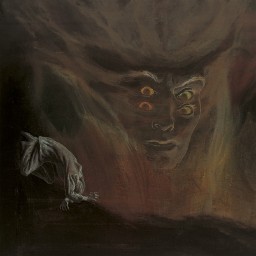
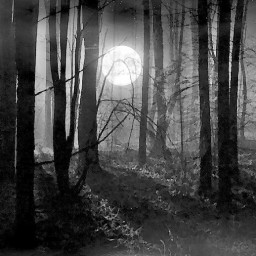 Sonny
Sonny
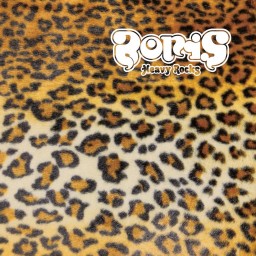
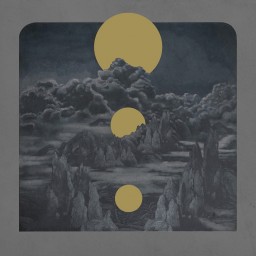
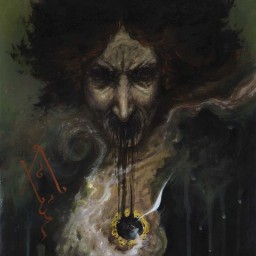 Vinny
Vinny
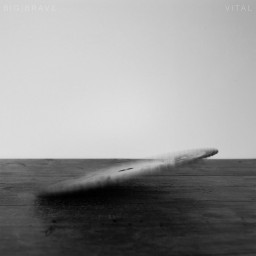
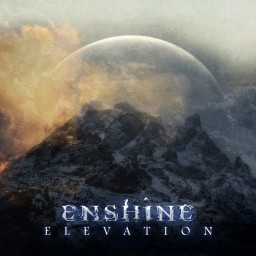
 Saxy S
Saxy S
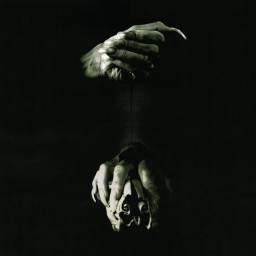
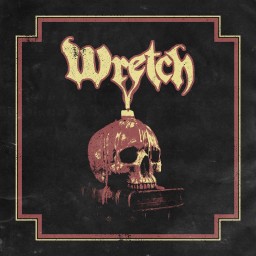
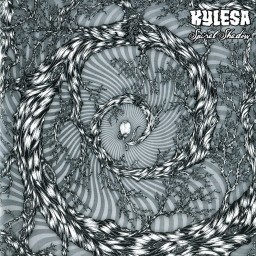
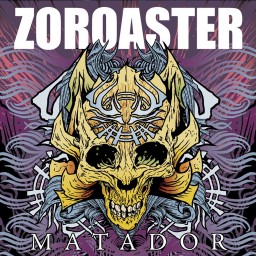
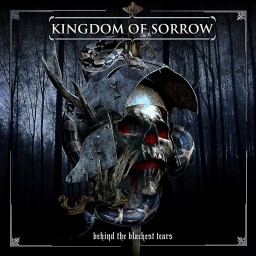
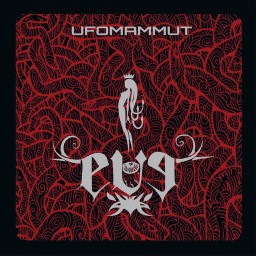
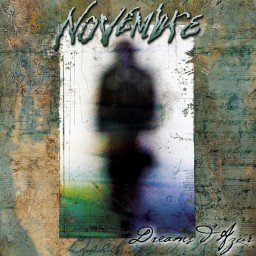
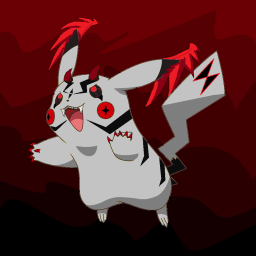 SilentScream213
SilentScream213
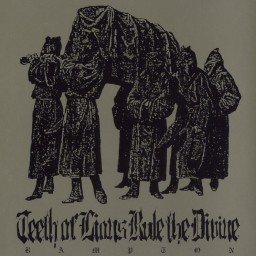
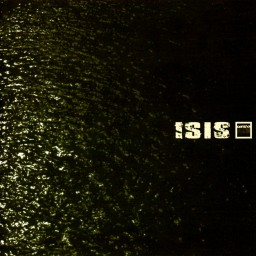
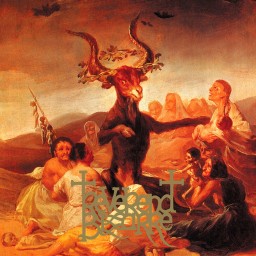

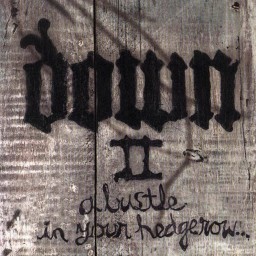
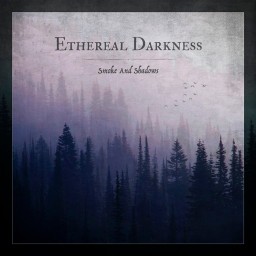
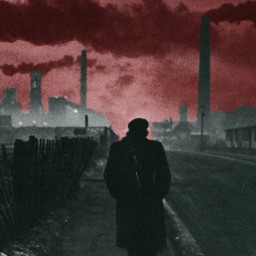
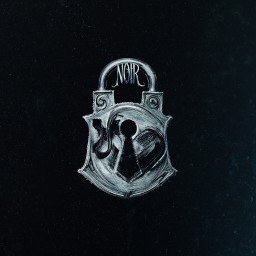
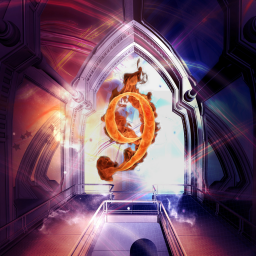 Shadowdoom9 (Andi)
Shadowdoom9 (Andi)
